the VOLUNTEER
THE MISSION IN ZAMBIA:
How Maranatha is building faith, education, and health
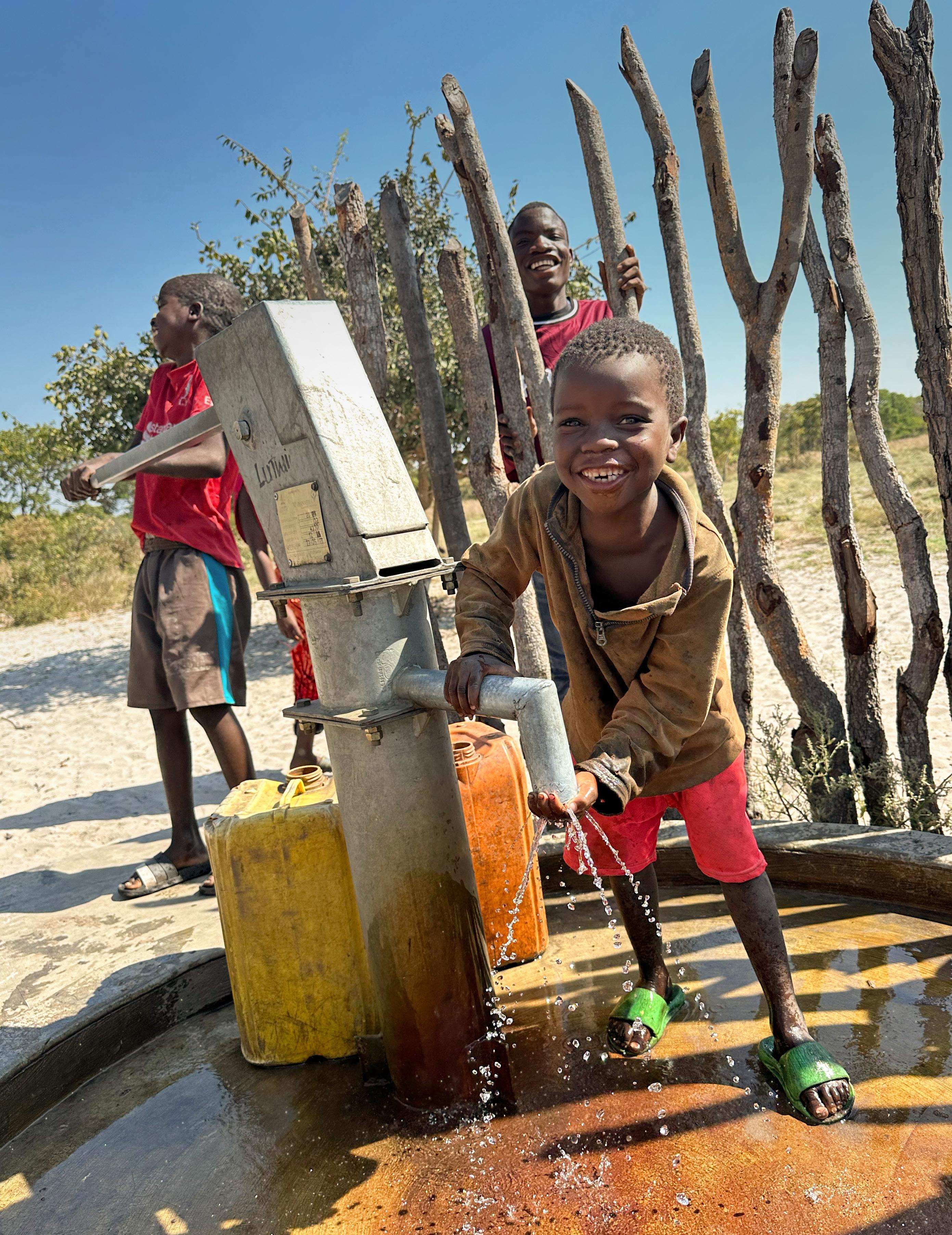
A Publication of Maranatha Volunteers International ISSUE 3, 2023
SANTO DOMINGO, DOMINICAN REPUBLIC
Sonya Page (purple shirt), Kate Horning (blue shirt), and Kyndree Duckett (pink shirt) give a fresh coat of paint to the Caleta II Seventh-day Adventist Church, which was originally constructed by Maranatha in 2013. The girls were part of the 2023 Family Project, in June, where 92 volunteers of all ages came together to not only paint Caleta II but to also build the walls of the Caleta IV Church and pour a slab foundation for the Hacienda Estrella Church.

Outside of construction work, volunteers also organized medical
VOLUNTEER the
Julie Z. Lee Editor
Heather Bergren Managing Editor/Designer Dustin Comm Writer
Sidney Needles Writer
UNITED STATES HEADQUARTERS: Maranatha Volunteers International 990 Reserve Drive
Suite 100 Roseville, CA 95678
Phone: (916) 774 7700
Website: www.maranatha.org
Email: info@maranatha.org
IN CANADA:
Maranatha Volunteers International Association c/o V06494C
PO Box 6494, Station Terminal Vancouver, BC V6B 6R3 CANADA
All notices of change of address should be sent to the Maranatha Volunteers International United States address.
Maranatha spreads the Gospel throughout the world as it builds people through the construction of urgently needed buildings.
clinics in the local community and saw 200 patients a day. Others provided Vacation Bible School programs and health education in various neighborhoods.
Maranatha offers two annual family projects a year, one in the summer and one over Christmas. These projects, which are specifically designed for families and volunteers of all ages, are one of Maranatha’s most popular mission trips. (See page 22 for our upcoming Family Project to Peru!)
About the Cover:
Children pump water from the Lutwi Seventh-day Adventist Church well, in Zambia. Maranatha has a goal to drill 300 new wells in the country this year.
Photo by Julie Z. Lee
Photo by Chris Duckett
SHARING THE Mission
COMPLICATED CLARITY
By Julie Z. Lee
Recently, I was interviewing Hans Yao, a volunteer, about his mission trips to Kajiado Adventist School and Rescue Center in Kenya. This is a haven for Maasai girls who have escaped child marriage. Since 2018, Maranatha has been expanding and improving their campus.

“You can’t go to a place like Kajiado and not come home changed, if only your perspective but really a lot more. Kids who have nothing love you because love is the only currency they have,” said Hans, who has now been there twice.
“How has the experience impacted your relationship with God?” I asked.
“I’m not sure how to answer the relationship with God part. To be honest, there were times I was pretty angry at God after seeing some of the things I saw there.”
It wasn’t the answer I was expecting. Typically volunteers talk about seeing God’s miracles, love, and grace on a project. But I resonated with his response.
Mission trips are emotionally complicated. You don’t always see that in our television show, “Maranatha Mission Stories,” or even in this magazine. The stories we love to hear are neater. Happier. Glowing with clarity. But there are messy aspects to travel as we encounter new
realities. Poverty. Illiteracy. Oppression. Abuse.
In my work, I’ve seen things that bring me great joy and wonder. I’ve seen things devastate me. But there was one moment that made me angry.
I was in São Tomé and Principe, interviewing a woman with no legs. She moved by dragging her body from place to place. As we talked, a crowd of children gathered. At first I smiled at them. Then I noticed their bare feet. Their ragged clothes. The flies on their faces and the sores on their bodies. Suddenly I felt like someone had punched me in the gut. I was so angry. Like Hans, I felt angry at God. Why God? Why do people have to live like this? Mostly, I remember being mad at myself. For having so much back at home. For not doing more here. For not knowing how to fix it. For not knowing where to begin.
“It’s a process,” Hans had said about his own frustration. “It’ll be ok.”
Han’s process involved turning initial anger from his first trip into action on this one. He came upon a video of an outreach kit that provides eyeglasses to people without access to vision care. Inspired, he funded a kit to take to Kajiado, where he set up a clinic for the campus and fitted kids with glasses.
“You do what you can.” Han says.
“Hopefully about a hundred kids can see a little clearer now.”
The need in this world is overwhelming. There is so much physical and emotional pain. As followers of Christ, we know to place it in God’s hands. As followers of Christ, we also know that God calls us to do something. And maybe that’s where we get frustrated, because we don’t know where to begin. How to be more than a small drop in a big bucket. Is one church enough when a place needs 500? Is one more school enough to transform a generation? Will one water well make a difference when millions are thirsty?
If you’ve been following the mission of Maranatha, you know the answer is, “Yes.” You’ve seen how people are changed one block, one dollar, one life at a time. The calling is to serve. Like Hans says, it’s a process. You do what you can. The rest will become more clear in God’s time.
And one day, it will be so much better than okay.
www.maranatha.org THE VOLUNTEER ISSUE 3, 2023 | 3
Julie Z. Lee is the vice president of marketing for Maranatha
AROUND THE World
A snapshot of volunteers and projects in the mission field.
KENYA
Maranatha has been working on the campus of the Kajiado Adventist School and Rescue Center since 2018, and in June the final volunteer group arrived, helping to construct a cafeteria and kitchen building.
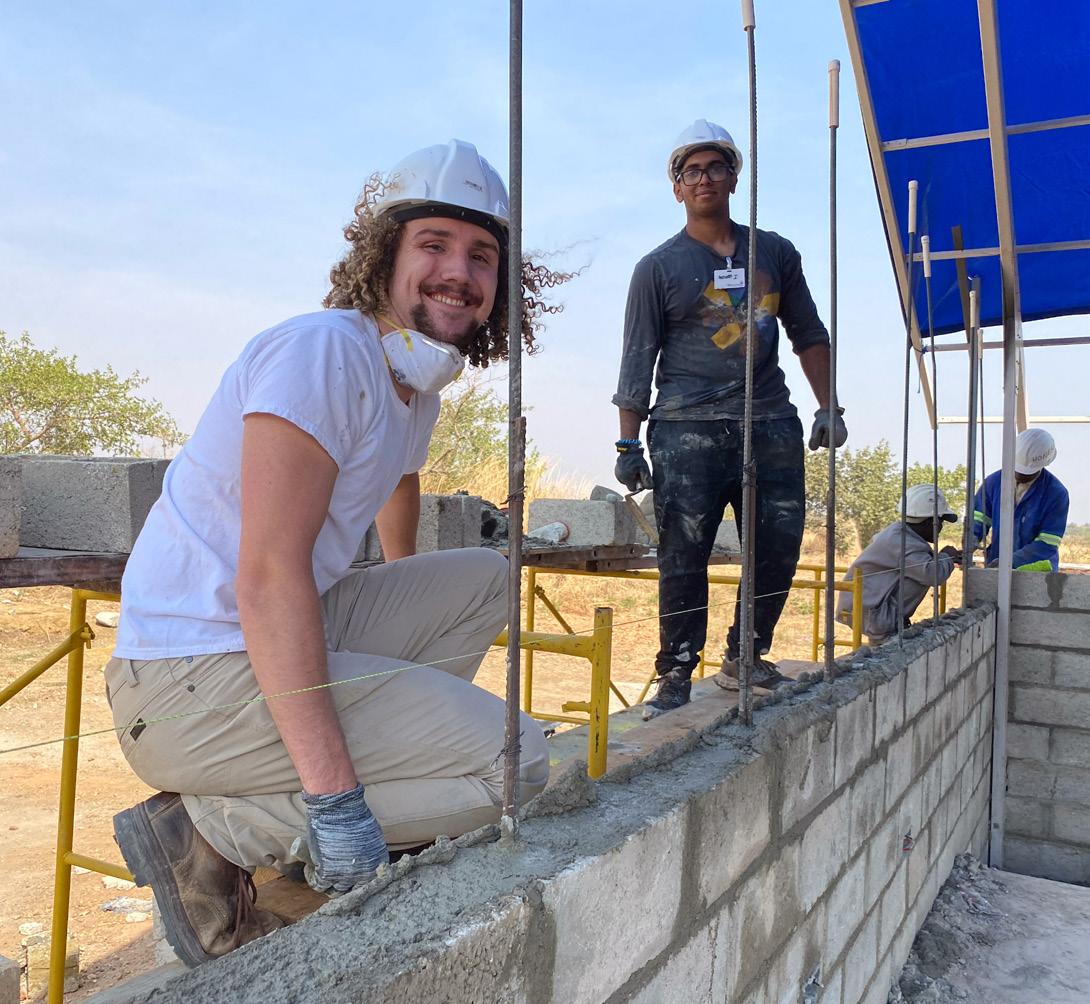
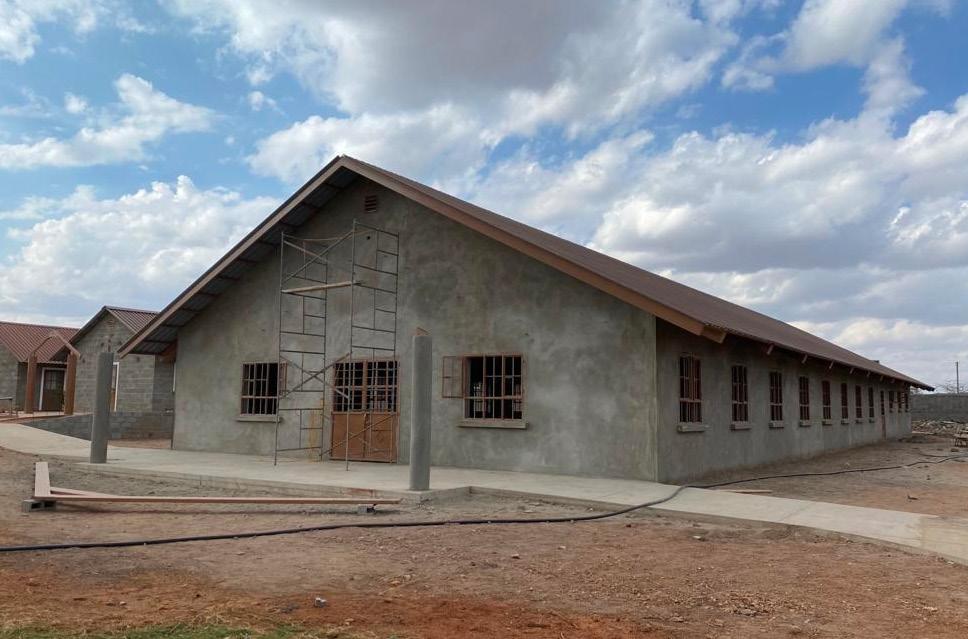
PERU
The Villa Azul congregation worships under a brand new Maranatha church frame and roof that will last for generations. Members will build up the walls using local materials.
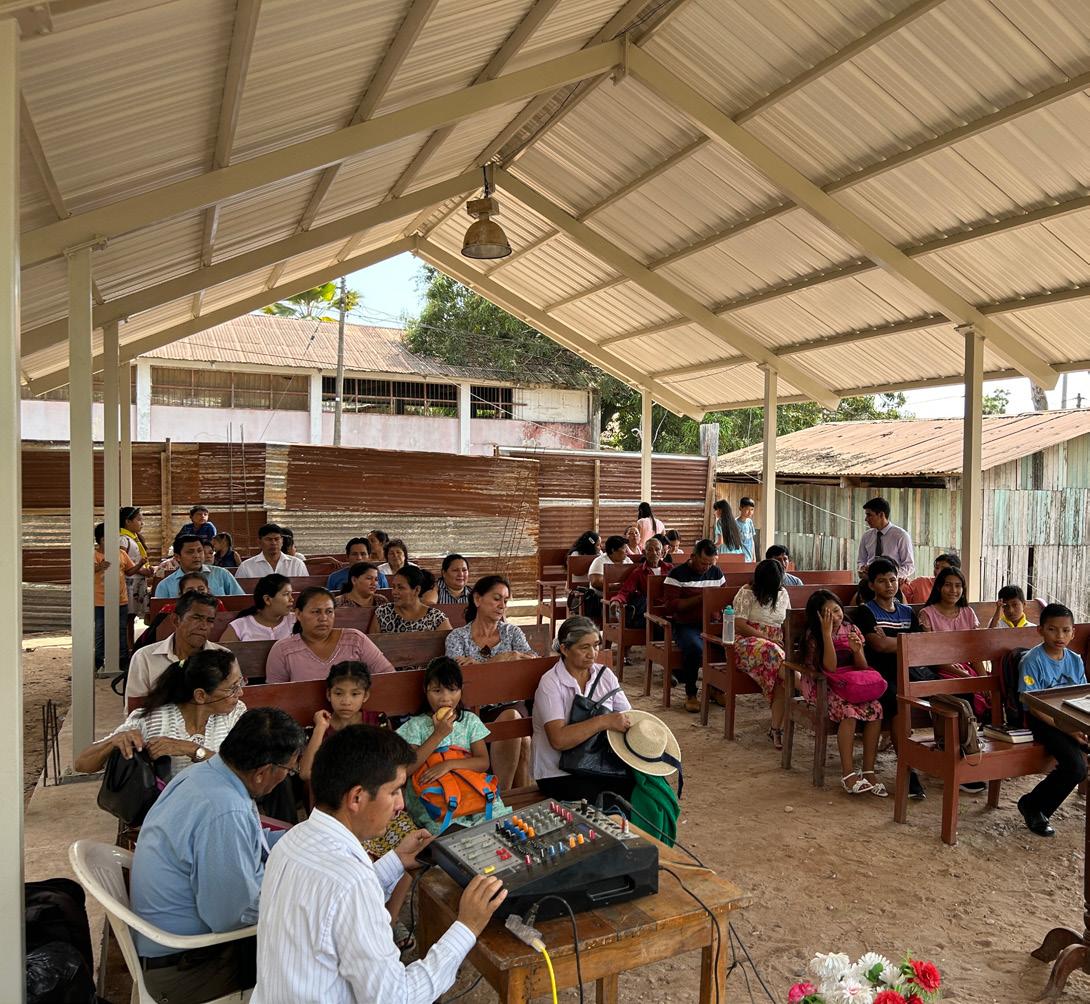
ZAMBIA
Volunteers from The Place Adventist Fellowship in California laid the block walls of a new church building for the Kakole Seventh-day Adventist congregation.
4 | THE VOLUNTEER ISSUE 3, 2023 www.maranatha.org
DOMINICAN REPUBLIC
Volunteers on Maranatha’s mission trip for high schoolers, Ultimate Workout, move cinder block into position at the Villa Primavera Seventh-day Adventist Church.
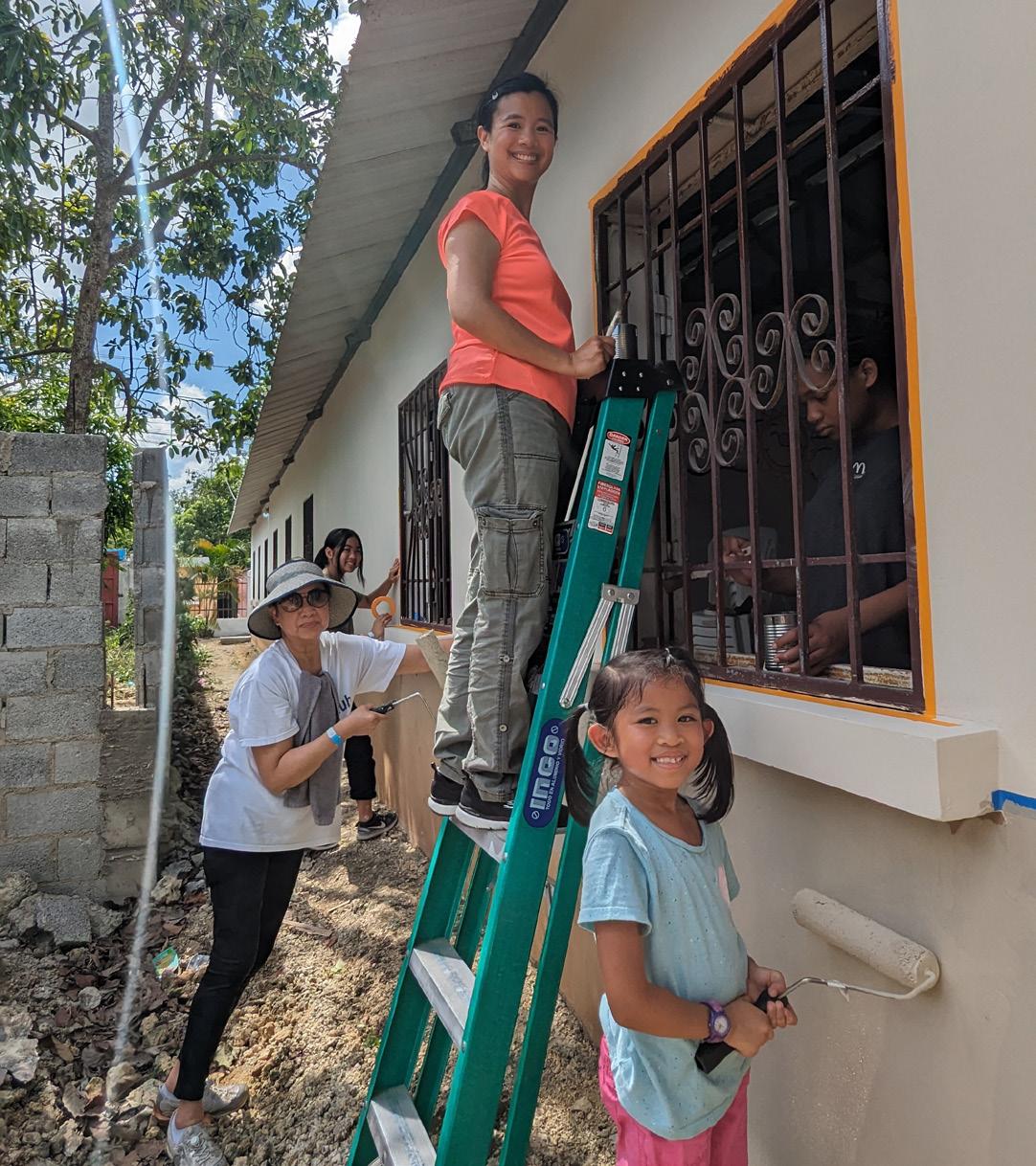
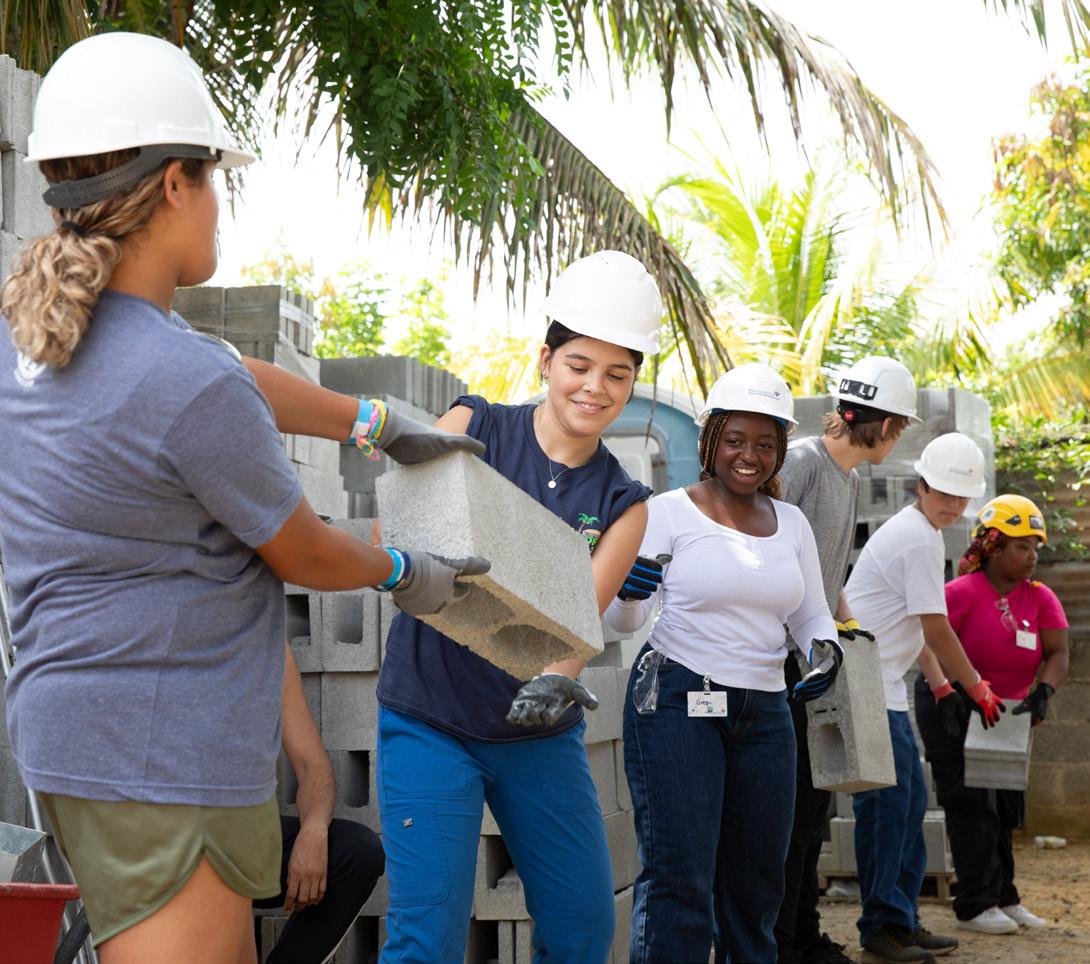
DOMINICAN REPUBLIC
Volunteers of all ages helped to paint a church on one of Maranatha’s annual Family Projects.
BRAZIL
Water well drilling ensues at the Renascer Seventh-day Adventist Church, located in the desert region of northeastern Brazil.

KENYA
Church and community members gather for a dedication of the new Maranatha water well next to the Gachoroni Seventh-day Adventist Church.

DOMINICAN REPUBLIC
Maranatha leadership and regional officials of the Adventist Church in the Dominican Republic participated in the dedication of the La Caleta 5 Church.

INDIA
Happy church members gather around the electric pump that pipes clean water directly to a tank at the Sirsi-A Seventh-day Adventist Church.
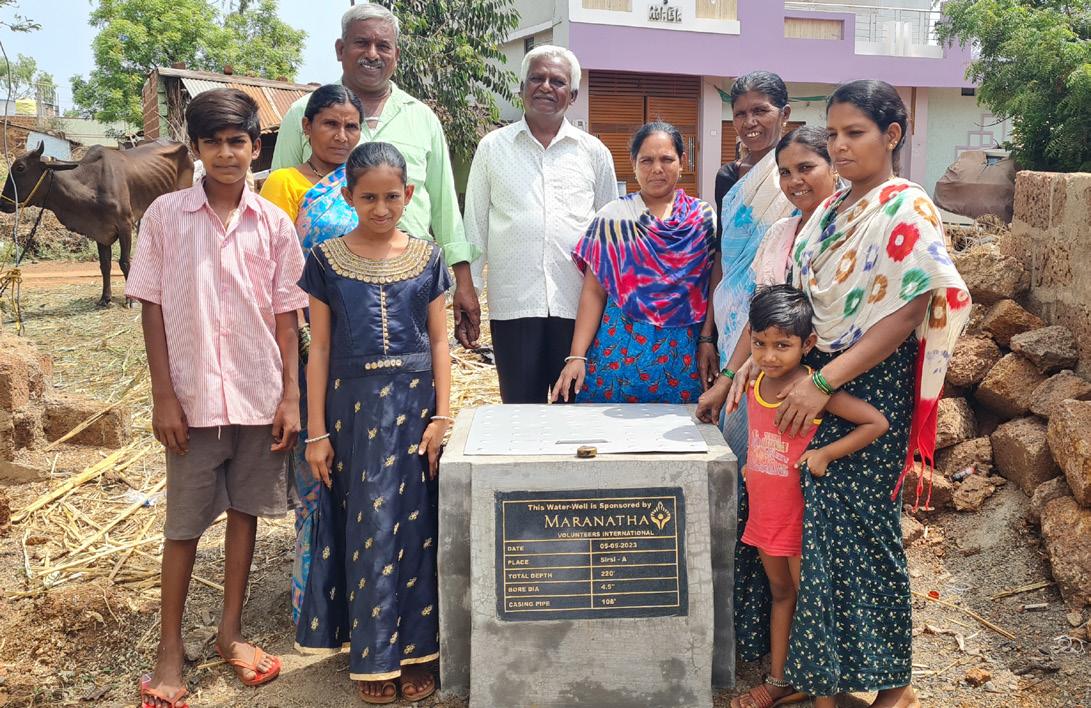
www.maranatha.org THE VOLUNTEER ISSUE 3, 2023 | 5
REVIVED AUDITORIUM IN NORTH CAROLINA
F or the third consecutive year, Maranatha volunteers poured onto the campus of Mount Pisgah Academy in Candler, North Carolina, in June. More than 50 volunteers completed a variety of tasks, including the renovation of two guesthouse bathrooms, which involved removing old tubs and putting in new showers. But the main focus of the project was the renovation of the school auditorium. The space was gutted—300 stadium seats were removed, as well as old flooring. New sound wiring was installed, and the sound booth was expanded four times larger than before.
Previously there was no real stage, so volunteers constructed an elevated stage with ample storage on
both sides. Sheetrock was installed throughout the auditorium, even in high places reserved for a contractor who didn’t show up. The group also applied new paint and installed carpet tiles before their work ended. As a gift to the school, volunteers raised more than $700 for stage curtain rods.
Return volunteers to Mount Pisgah continued to deepen their connections with God and each other. “We’ll miss the camaraderie, the friendship, and the fun,” said Joy Thomas in poem. “It kinda leaves a loneliness when all the work is done. Each one that came to participate worked hard without a shirk. Each leaves behind some of their heart left there by very hard work.”
Even first-time volunteers like Myrtice Lawson were impacted
beyond their expectations. “I didn’t realize I could be so spiritually fed. I thought I would learn how to do construction, but you guys have turned my world upside down. It’s been so spiritual.”
Each year, Maranatha works with organizations in the United States and Canada to provide volunteer labor for various construction or renovation projects at summer camps and retreat centers, schools, and churches. Work ranges from renovations of existing buildings to new construction and saves thousands of dollars in labor costs.
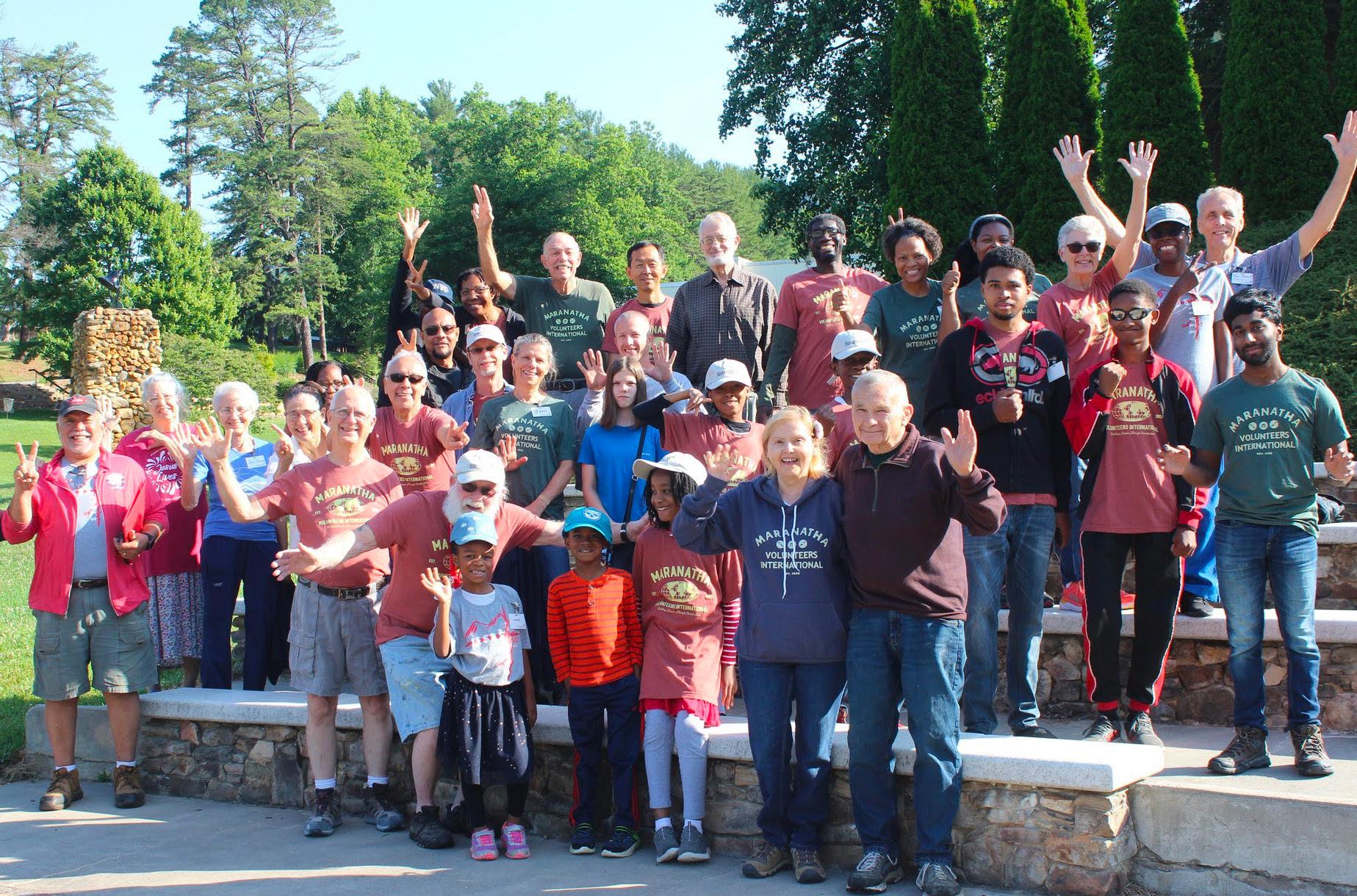
6 | THE VOLUNTEER ISSUE 3, 2023 www.maranatha.org
News + HIGHLIGHTS
More than 50 volunteers helped with renovations at Mount Pisgah Academy in North Carolina. There are two dozen projects scheduled in North America this year.
CONTINUED PROGRESS IN INDIA
Maranatha’s work in India rolls on, with in-country crews working on churches in two separate regions of the state of Tamil Nadu. Water well drilling continues to make a big impact in this Asian sub-continent; as of September 2023, Maranatha has drilled 202 wells at Seventh-day Adventist churches and schools across the country. Drilling in the state of Andhra Pradesh will persist into next year, where nearly 700 churches were constructed by Maranatha in years past. These crucial sources of clean, accessible water are not only available to Adventist church members, but are free for the entire community to use.
Since 2022, Maranatha has been
active on the campus of the Binjipali Adventist School, constructing dormitories, classrooms, restrooms, a kitchen, and a cafeteria. At the end of August, Maranatha joined regional Adventist leaders in a dedication ceremony for the latest structures completed. Bright new furniture is ready in the classrooms and cafeteria, and school leaders are excited for the future growth of the school. Maranatha will continue working at Binjipali into the future, constructing additional dorms, principal’s housing, and a large multiclassroom building Maranatha calls an
CHURCH AND SCHOOL COMPLEX DEDICATED IN ZAMBIA
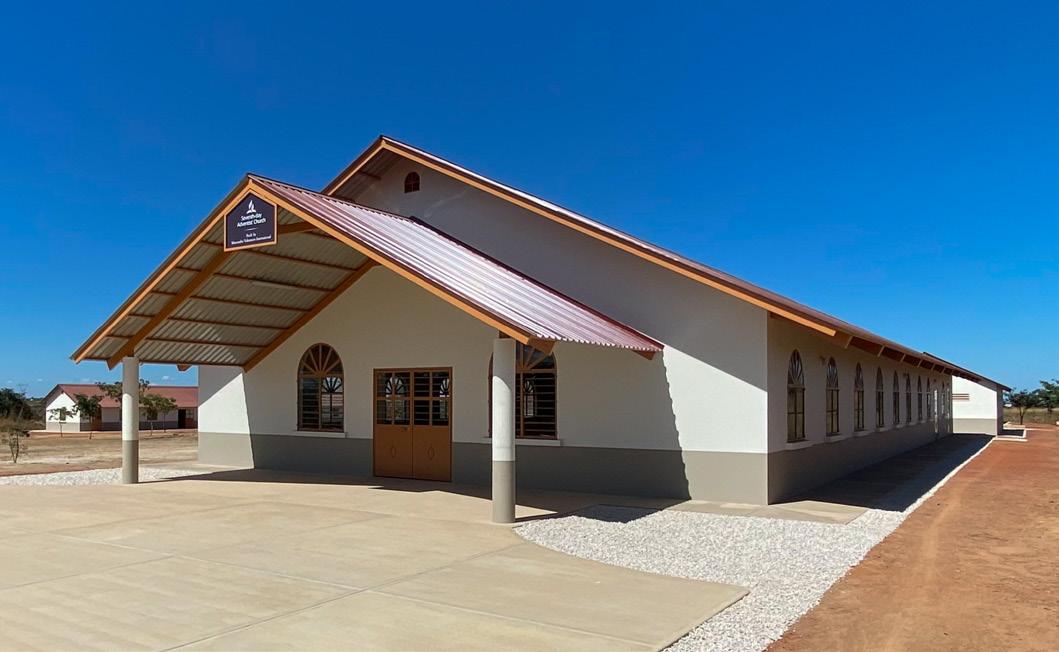

Maranatha leadership recently participated in the dedication of a brand new church and school complex in Zambia. The Bethsaida Seventh-day Adventist Church was destroyed by a storm in January 2022 that killed five people and left more injured. The Adventist Church in Zambia came to Maranatha for help, and over the past year and a half, Maranatha volunteers and local crews have constructed a large sanctuary that can seat up to 500 people.
The new campus also includes bathrooms, a water well, and six
Sabbath School classrooms, which will serve as an elementary school during the week. The new name of the campus is the Bethsaida Seventhday Adventist Memorial Church and Primary School. “The nearest primary school has 1,204 students in five classrooms, running two shifts a day,” said Maranatha country director for Zambia, David Woods. “This school is much-needed to provide quality Christian education in this area.”
In July, Maranatha leaders, donors, and regional officials of the
Elementary Education Center. Crews will also renovate existing structures on the campus.
Maranatha has had a continuous presence in India since 1998, building places of worship and education throughout the country. In 2019, Maranatha also started drilling water wells in areas in need of clean water. Maranatha has constructed more than 2,400 structures in India.
Adventist Church in Zambia attended a dedication. Church members are amazed and grateful for the transformation that has come out of this tragedy.
Maranatha worked in Zambia from 2009-2015, completing hundreds of projects. In 2018, Maranatha returned to Zambia in response to a request for more churches, schools, and water wells across the country.
www.maranatha.org THE VOLUNTEER ISSUE 3, 2023 | 7
MISSION TO THE Amazon
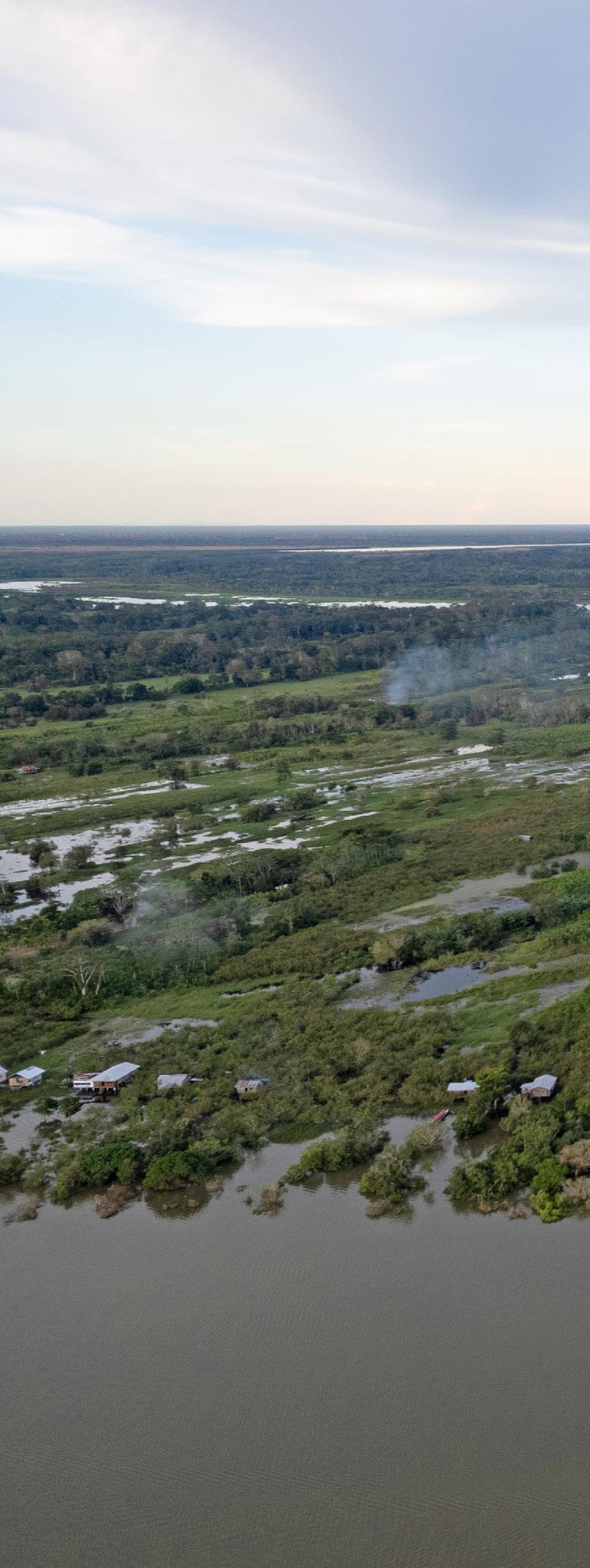
Maranatha returns to the Amazon jungle of Peru to support the Gospel through church construction.
By Dustin Comm
Water shot out toward the plane’s wings as the engine throttled to a deafening roar, the hull shaking from friction as it screamed across the water. The pilot held the overhead throttle steady as the craft rushed ahead, rattling as it continued to pick up speed until, for a moment, it shrugged slightly off the surface of the river. More minor lifts followed, the plane willing itself to part from this liquid runway as separations ramped up in frequency until, in an instant, there was calm tranquility—the aircraft soared into smooth open sky. This exhilarating takeoff is part of the daily routine for missionary pilot Eben Ezer Espinosa Castro. For eight years he’s worked for a ministry that was recently adopted by the Seventhday Adventist Church in east Peru called “Peru Projects.” “I always had a dream, since I was a child, to serve God as a pilot missionary anywhere,” reflects Castro.
Growing up in Mexico, Castro studied theology at Montemorelos University before heading to the United States to pursue a Masters in Divinity at Andrews University in Michigan. But his dream faced a huge hurdle: he didn’t have the money to pay for the degree. Throughout his graduate program, he searched for sponsors, was blessed with odd jobs, and was amazed as fervently specific prayers were answered in front of his
eyes. He started with nothing and graduated with no debt.
Being free and clear, Castro hesitated to continue with the aviation program; with his theology degree he could become a pastor and start earning a salary right away. Again, God provided the necessary funds to study aviation. “God clearly opened the way, opened the doors, and showed us that He would fulfill [this dream], and thank God, He did,” recalls Castro. It was during his last semester in aviation at Andrews that
8 | THE VOLUNTEER ISSUE 3, 2023 www.maranatha.org
“I always had a dream, since I was a child, to serve God as a pilot missionary anywhere.”
Castro heard about Peru Projects and their need for a pilot. He could see the skills and education God was giving him as a pastor, mechanic, and aviator; it was exactly what was needed in this ministry. And so, Castro and his family moved to the jungle city of Pucallpa, and began to live out his childhood mission aviation dreams. “It was really nice to see confirmation from God that [this journey] was His will, He was guiding us, and He got us through it, because he had a place for us to serve,” said Castro.
This Amazon region of Peru is home to the largest Adventist “mission” (a conference that is not yet self-supporting) in the country—an

expansive sprawl of wild rainforest that includes the Amazon River, the world’s largest by volume. It is also where dozens of indigenous people groups have lived in isolation for generations, maintaining their traditional way of life away from modern society. Today, many have experienced the outside world, but some are still truly uncontacted. Their segregated existence has lasted so long because at the edge of the jungle, the roads end. Here, rivers are the thoroughfares for transportation, and the indigenous population is spread out over around 200,000 square miles of jungle. Even in a fast boat, Castro explains it can take 20-40 hours to
AN EXPANSIVE MISSION FIELD:
The Seventh-day Adventist Church in East Peru is responsible for an area of around 200,000 square miles, much of it without any major roads.
www.maranatha.org THE VOLUNTEER ISSUE 3, 2023 | 9
reach some of these villages; in larger cargo boats, it can take days. The scale of this place makes evangelism extremely difficult.
“One of the greatest challenges that our mission has is being able to reach [these] communities,” admitted Juan Saldaña, president of the Adventist Church in East Peru. “The pastors who work in the inner river zones, the thickest part of the forest, the biggest difficulty is the transportation.”
According to Castro, there are thousands of villages throughout this territory, and the Church is actively working in 82 of them, the majority made up of the Shipibo and Asháninka tribes. Village life is simple in these communities— residents grow their own food, raise chickens, and catch fish in the river.
On the surface, this idyllic setting looks like paradise, but Castro has seen firsthand the problems these people face. If someone gets seriously sick out here, they die. There are no hospitals or medical clinics when injuries or illness arise. “So despite having this beautiful community that looks like paradise, they face things that they don’t have a solution for,” said Castro. “And then they can be discouraged because they don’t know how to face them. So that’s where the value of the Gospel message comes in, and they can see to the future, see eternity. That changes their view or their mindset.”
A crucial part of Peru Projects’ ministry is operating emergency medical flights into the jungle for critical patients in need of professional attention. Whether it’s in the amphibious Lake 250 Renegade aircraft or, when a landing strip is available, the Cessna 182, Castro and team work with embedded missionaries to respond to these time-sensitive situations. Over their years of service, rapport has grown between missionaries and the tribes, allowing for the Gospel to spread. As communities create congregations, they need places to worship, which normally takes shape in a rickety wooden structure. These buildings are weakened by the consistent Amazon rain and termites that

10 | THE VOLUNTEER ISSUE 3, 2023 www.maranatha.org
“One of the greatest challenges that our mission has is being able to reach [these] communities ... the biggest difficulty is the transportation.”
1
feed upon the walls. “Right now most of the churches are falling apart,” said Castro. “It is just the reality.”
The Adventist Church in East Peru asked Maranatha to help with proper places of worship in this region. Maranatha has worked here before, building churches and other structures in the mid-2000s. Today, the starting point will be the city of Pucallpa near Castro’s aviation mission outpost. From there, Maranatha’s work will head down the river to villages spread throughout the jungle.
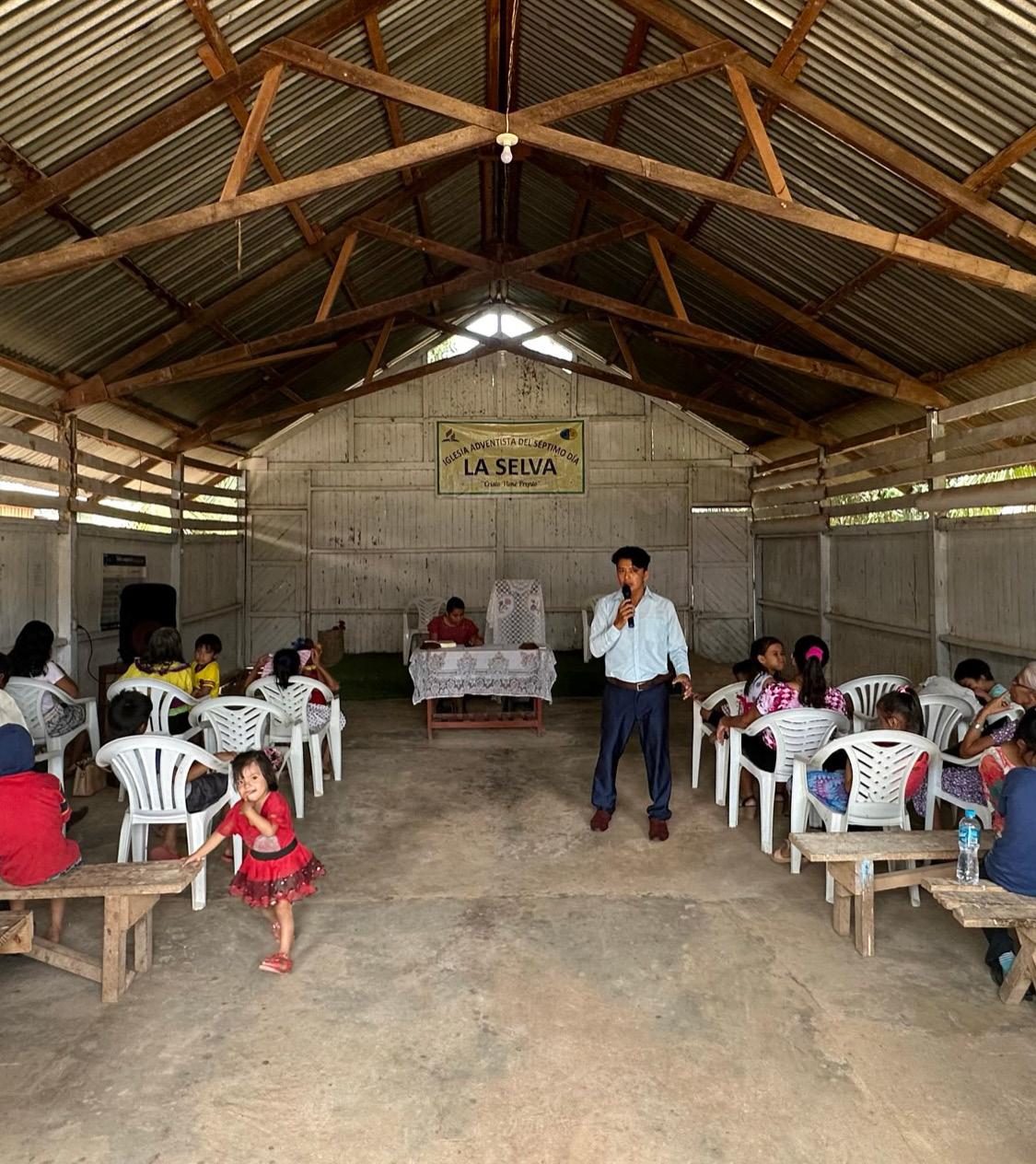
Glendy Franco de Gomez is a Shipibo woman who grew up deep in the jungle. Her parents were traveling teachers who would move from village to village by boat, educating indigenous children. When she reached adulthood, Gomez followed in her parents’ footsteps, graduating as a teacher from an indigenous university in Pucallpa. Today, she teaches at a government elementary school for indigenous children. She’s also become a leader at the La Selva Seventh-day Adventist Church.
The Shipibos are matriarchal, so women help guide society in many ways. Women are
also integral to a church’s stability and future growth. Each Sabbath, more than 30 people attend La Selva, including university students that are following Glendy’s footsteps from the jungle to the city. But Glendy would like to grow that number. “My dream for the church would be that we win over more souls and that they congregate here—that everyone who comes from the villages will congregate here, and that day by day, we keep working to bring more people to this place to worship God,” said Gomez.
However, a huge obstacle to this goal is the actual structure they meet in. The building is constructed of weak, rain-soaked wood. If strong enough winds blew, the church would collapse, causing serious injuries or worse. There are large gaps in the slat walls—rainfall pours in, flooding the floor. The roof recently flew away in a storm—they reattached it, but it may not last for long. Plus, this metal roof is oppressively hot and humid in the jungle heat. And because La Selva is a growing congregation, there is no room for future growth, especially when university students are present during the school year.
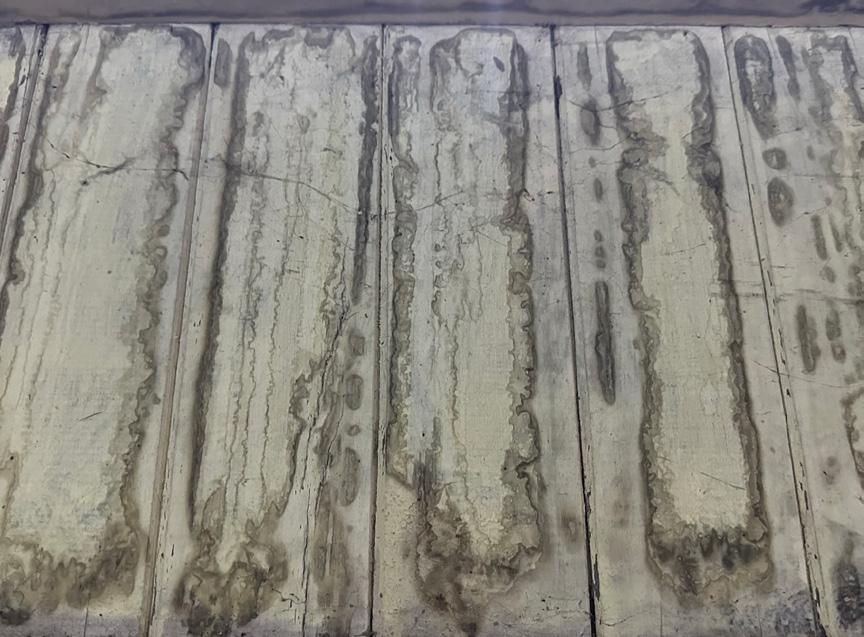
With all of these challenges, sometimes
JUNGLE CHURCH
1 Missionary pilot Eben Ezer Espinosa Castro examines an amphibious Lake 250 Renegade airplane before a test flight.
2 La Selva Seventhday Adventist Church serves the indigenous Shipibo community in the jungle city of Pucallpa.
3 Though fervent, La Selva’s members are stalled in evangelism efforts due to a church building that presents many problems.
4 Most of the churches in the city of Pucallpa are made of rain-soaked, water-damaged wood that compromises the integrity of the structure.
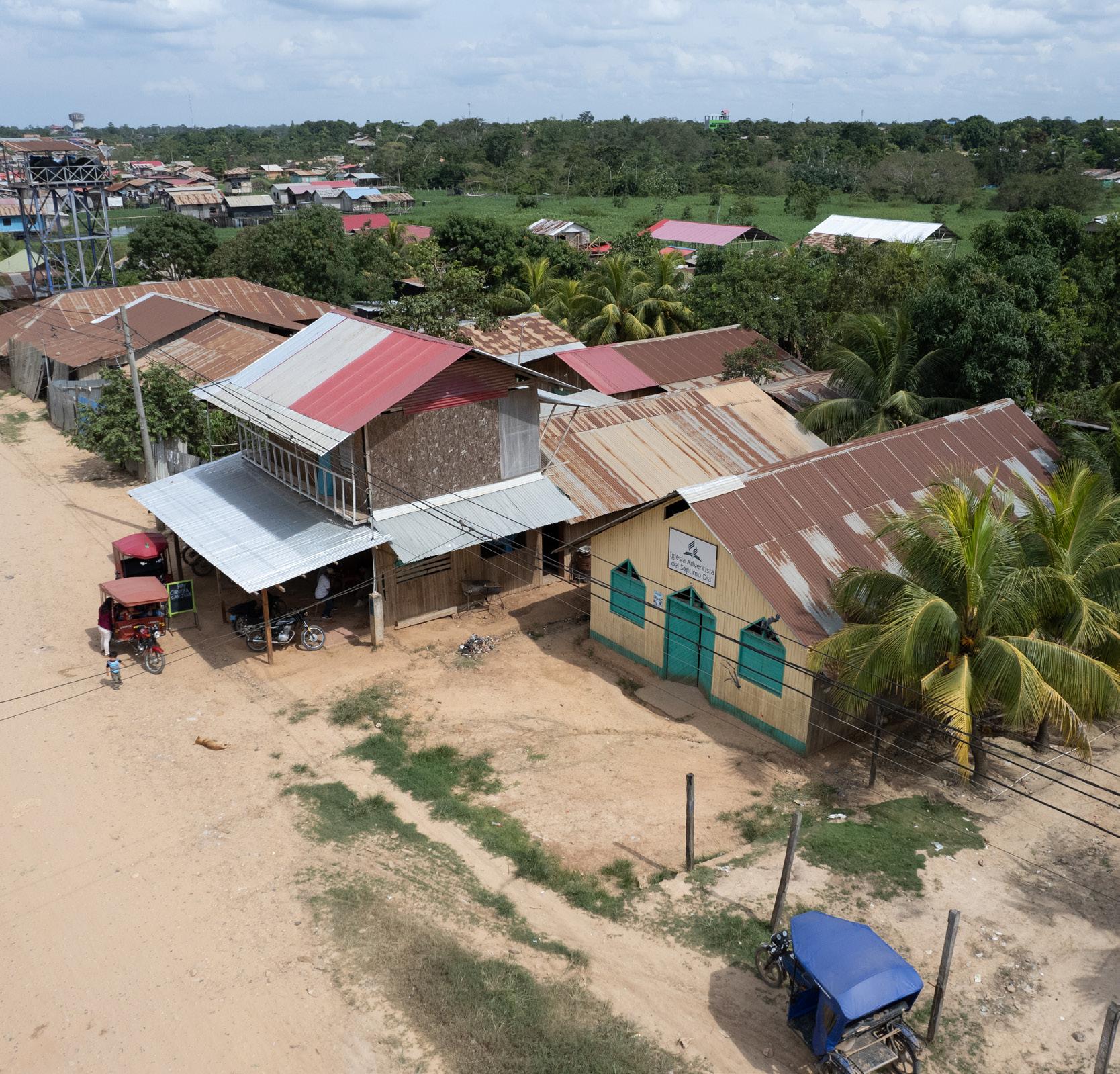
www.maranatha.org THE VOLUNTEER ISSUE 3, 2023 | 11
2 4 3
PHOTOS: (1, 3-4) DUSTIN COMM (2) LOGAN CARTER
members simply cannot worship here because the space is unusable. Often, they just stay home where it’s cooler, dry, and safe. Without the financial means to construct a stronger, more permanent sanctuary, La Selva can only wait and pray for a miracle. It’s a story that’s repeated over and over again in Pucallpa.
Maranatha’s commitment to churches in Pucallpa is to provide special roofs that won’t absorb as much of the jungle heat and are quieter in the rain, as well as strong, permanent steel frames that will last for generations. Congregations will then build up the walls using local materials. To La Selva’s delight, their church was on the list that Maranatha is helping. “It’s a big help for us because, in reality, those of us who congregate, we have very few professionals who can build,” exclaimed Gomez. “We can continue to save and finish the church.”
Maranatha established a workshop in Pucallpa where all of the components for our churches in this region will be fabricated. Our in-country crew is creating these steel elements, and entire church frames have gone up at sites throughout the city. Soon, La Selva will demolish their current structure to make way for a solid permanent one, ushering in a new phase of possibilities for the evangelism and growth that Glendy dreams of.
Work has already begun on these new buildings, and soon La Selva will be set to pursue its dreams. This same joy will be shared by church members throughout the city of Pucallpa. Congregations are beginning to demolish their old, unsafe buildings in preparation for Maranatha to arrive. Soon, they’ll be worshiping in permanent structures through which the gospel can shine for generations. Maranatha is also drilling water wells in Pucallpa in situations where there is need.
After Maranatha’s initial commitment in Pucallpa is complete, the city will continue to serve as the launching pad deeper into the Amazon. Crews will start moving down the river into more remote communities that are harder
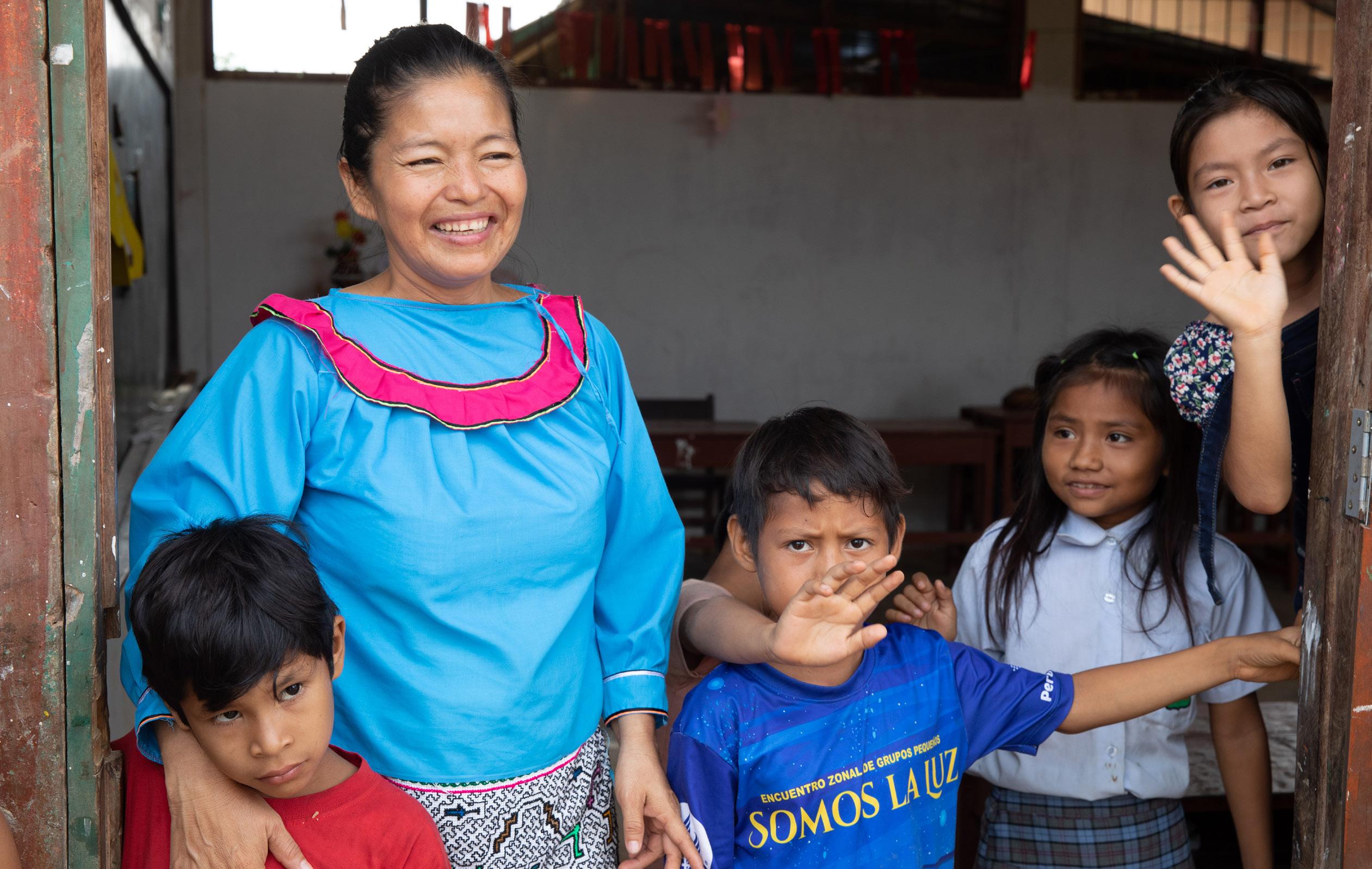
12 | THE VOLUNTEER ISSUE 3, 2023 www.maranatha.org
“It’s a big help for us because, in reality, those of us who congregate, we have very few professionals who can build. We can continue to save and finish the church.”
1
to reach. This will present unique logistical challenges, from making site visits with native congregations to transporting materials, workers, and volunteers. It’s a challenge that Maranatha country director, Elmer Barbosa, relishes. “It’s going to be difficult,” admits Barbosa. “We’re going to have to use boats sometimes, we are going to have to fly to places…but no one’s going [to these villages]. Even the Church has a challenge to reach those people. And if we partner with them, I think we can bring hope to those people and be the way that they get to know Jesus.”
Castro is excited for the possibilities of how God will use Maranatha and its volunteers to reach people from different tribes and tongues. He knows that the warmth and hospitality of the people of these remote communities will be felt by Maranatha. “I think it’s a big opportunity and a blessing for the indigenous people, and for the volunteers that come, because people in the jungle are very receptive…they’re very friendly,” explains Castro. “So if we bring volunteers, it’s easy to work with the villagers and it will definitely be an impact for them—for the community, as for the volunteers that are involved there.”
Dreams are coming true in the Peruvian Amazon. Childhood fantasies of adventurous mission work in the jungle. Lifelong desires to finally have a proper, permanent place of worship. Goals to grow the Church. A yearning to know that people from far away care about physical and spiritual needs. There are still many more dreams to be realized here. For now, Maranatha is answering the call to be Jesus’ hands and feet to people of different cultures and languages here in the Amazon, whether it be convenient or complicated, and by any means necessary.
Watch “Mission to the Amazon,” a Maranatha Mission Stories episode based on this story at maranatha.org/amazonmission
A NEW CHAPTER:
1 Glendy Franco de Gomez is a Shipibo woman who teaches at a government school for indigenous children.
2 The Shipibo people are matriarchal, with women leading the community and church in many ways.
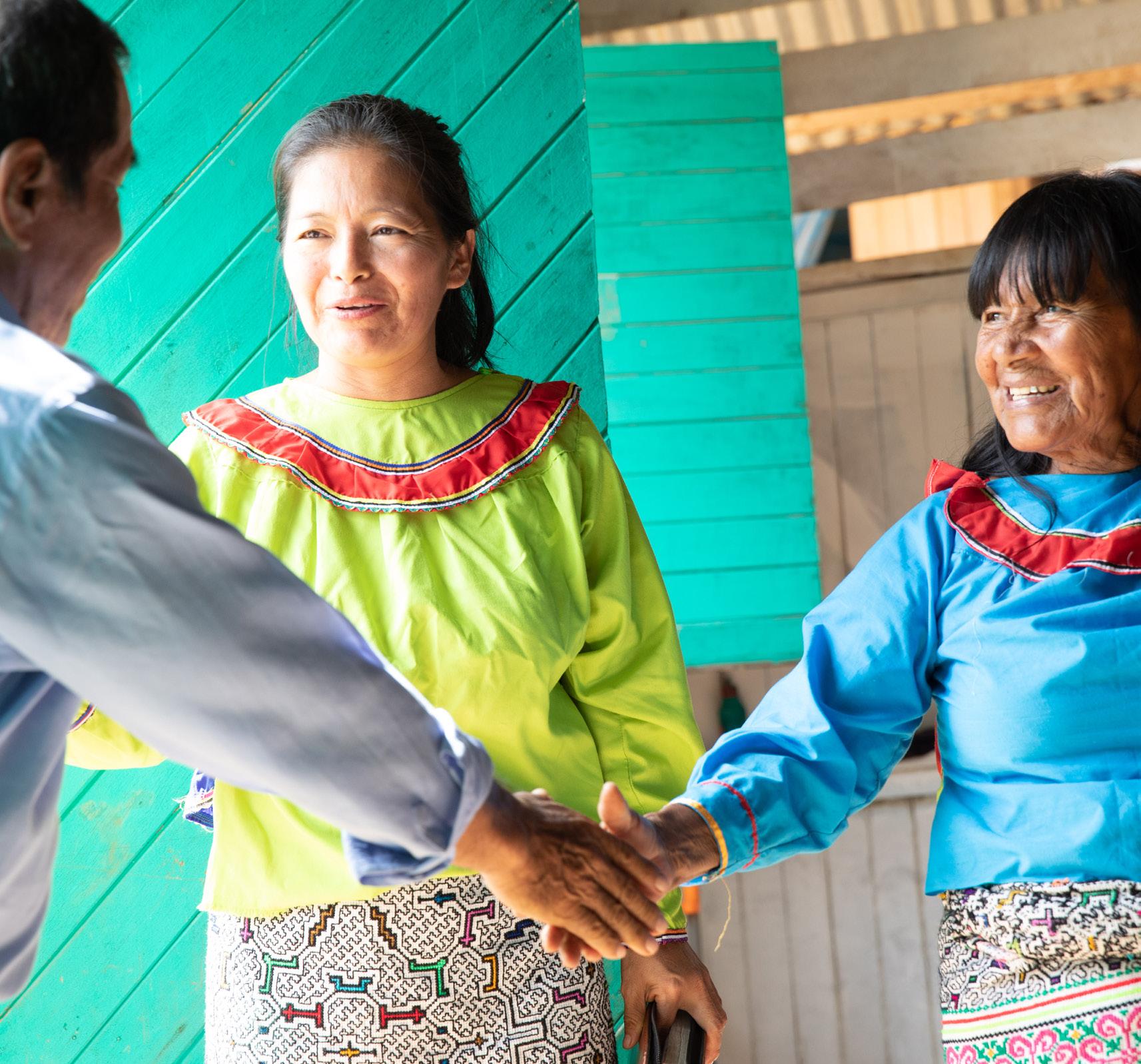
3 Maranatha established a workshop in the jungle city of Pucallpa where churches are fabricated and sent out for construction.
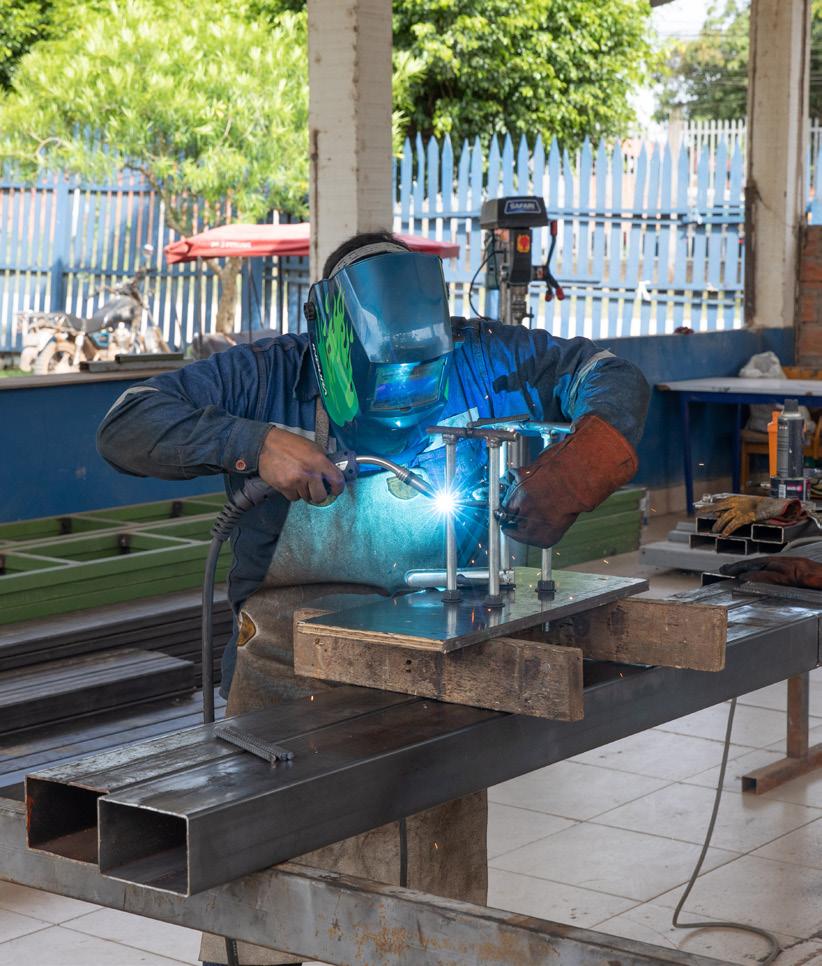
4 Crews have been working to fulfill Maranatha’s initial commitment in Pucallpa. The city will continue to serve as the launching pad for future work deeper into the Amazon.
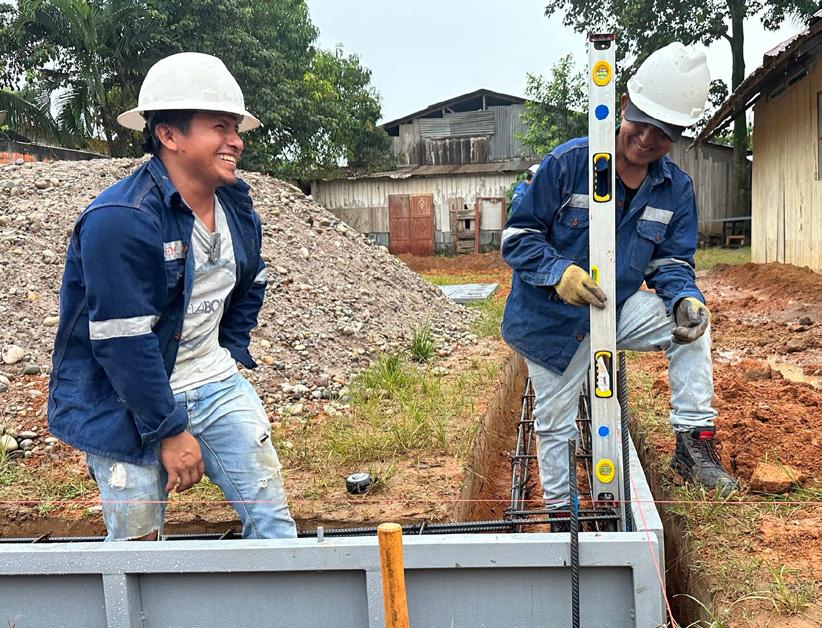
www.maranatha.org THE VOLUNTEER ISSUE 3, 2023 | 13
2 4 3
PHOTOS BY DUSTIN COMM
THE MISSION IN Zambia

How Maranatha is bringing change across the country.
By Julie Z. Lee
www.maranatha.org
Zambia, located in central south Africa, is a country about the size of Texas. While its capital, Lusaka, boasts the typical developments of modern cities–fine hotels, shopping centers, and high rise buildings–the rest of the country is more rugged and undefined. Move past the borders of its bigger cities and towns, and you’ll find a lifestyle frozen in time. People push through waterways on narrow, hand-carved canoes. Men with machetes harvest tall, wild grass on the side of the road to make thatch roofs. Children run happily through clusters of mud huts that comprise a family unit within a village. Women, wrapped in colorful fabrics, carry buckets of water on their heads.
It is a scene of idyllic beauty and longing for a time when life was simpler for everyone. But once you spend more than a tourist’s minute
with the people, you begin to understand the cost of such nostalgia. The people on boats spend all day fishing or taxiing riders from place to place to earn an income that leaves them trapped in poverty. The charming thatch roofs sit atop a framework of sticks and mud that disintegrates in the heat and rain. Children stay home because there is no school to go to, no access to opportunities that can change their futures.
Women and girls spend hours searching for water. They dig shallow wells. They walk to watering holes. They eventually find water and drink it, then get sick from the contamination.
This reality is why Maranatha is in Zambia, working to build OneDay Churches for congregations that need an enduring place of
worship, schools for children who need access to education, and water wells for the general good health of everyone. Maranatha’s first effort in Zambia started in 2009 and continued over the next six years. The work started up once more in 2018 when Maranatha responded to a request for more projects from the Seventhday Adventist Church leadership in Zambia. In 2021, Maranatha launched a water maintenance program, which now has crews in Zambia traveling from site to site, doing maintenance and repairs on existing wells. The flurry of activities makes Zambia one of Maranatha’s most prolific countries in terms of completed or active projects.
Over the next few pages, we’ll share the work of Maranatha’s current work in Zambia and how you can continue to impact these communities.
NEW SPACE: Members of the Ngombe Seventh-day Adventist Church gather in their One-Day Church, provided by Maranatha. Although the members are still building the walls, the congregation has already grown from 40 to 60 members; there are more than 100 people attending each week.
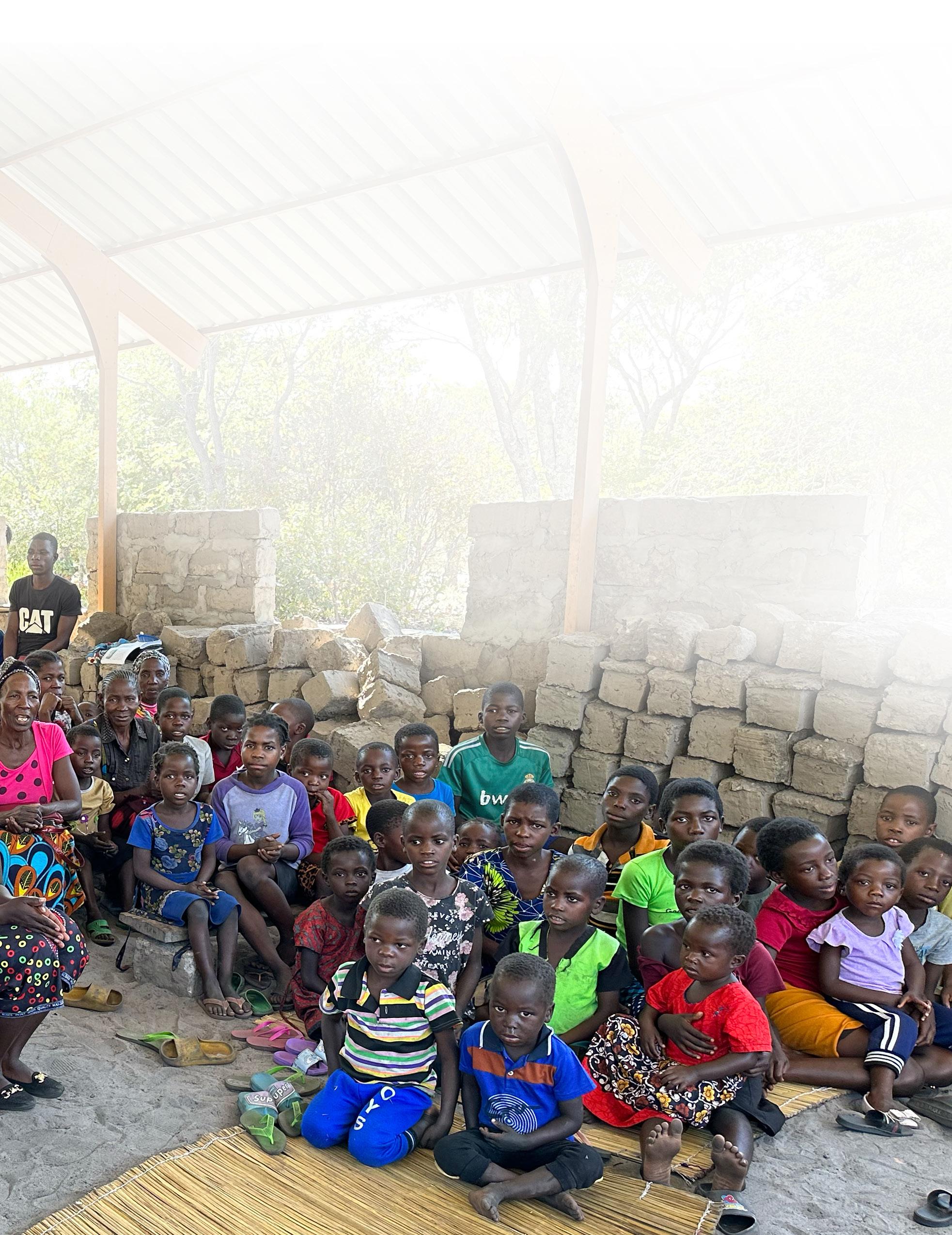
ONE-DAY CHURCH
Launched in 2008, the One-Day Church (ODC) program continues to provide strong, safe structures for hundreds of congregations around the world. The program has been especially helpful and successful in Zambia, where Maranatha has a goal to build 120 ODCs this year.
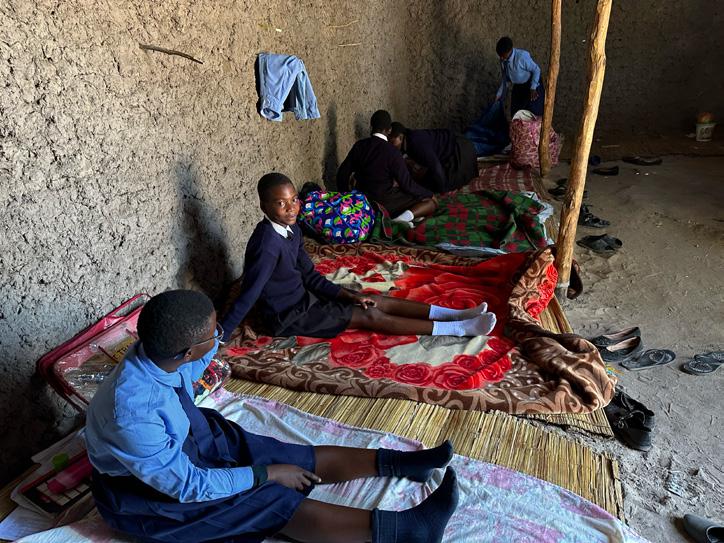
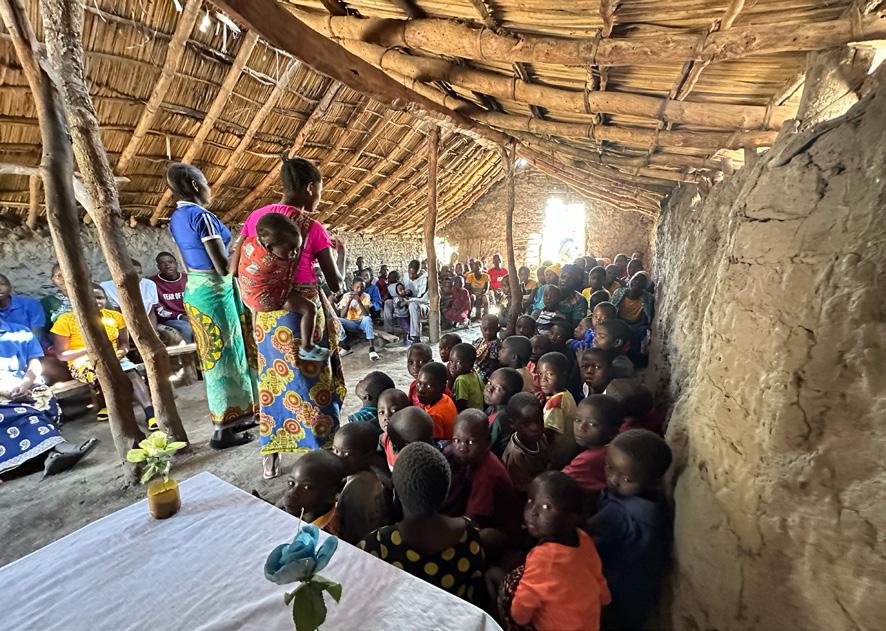
The Lutwi Seventhday Adventist Church has 51 members and 100 attending in this sagging structure. Lutwi is representative of many churches in this region, where mud, sticks and water are the only materials available. With a One-Day Church, the steel frame and roof provides a solid starting point upon which to build a sturdy and reliable church.
SCHOOLS
Schools have always been a priority in Zambia as there is a shortage of Adventist educational centers in the country. Most recently, Maranatha expanded the campus at Liumba Hill, located in the western part of the country. This year, we are examining requests for a school in Sala, near Lusaka, and a campus at Mwami Adventist Hospital, on the far eastern border of the country.
After meeting in a mud and straw church for years, Maranatha crews arrived in Ngombe to erect a One-Day Church. Immediately after, church members began meeting three days a week to mold bricks and build the walls.
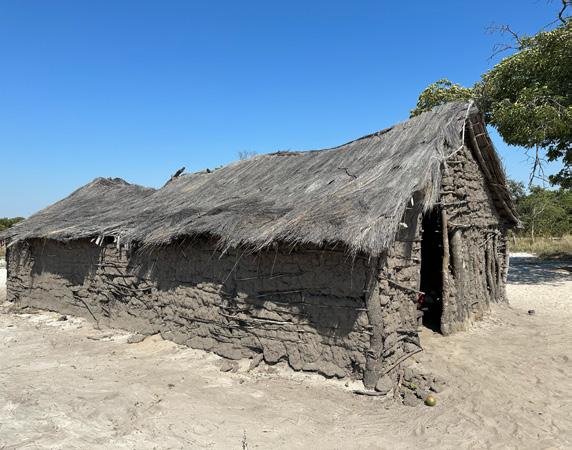
Students who seek an Adventist education and live far from Liumba Hill must find their own housing near the school. This option typically isn’t safe, as female students in particular are vulnerable to assault and robbery. These girls (left) live in this mud structure, but others must live alone by renting a room in the community. Maranatha is currently planning to build a girls’ dormitory at Liumba Hill.
Founded in 1928, the remote location of the Liumba Hill Adventist School made it difficult to receive renovation or construction help. But Maranatha agreed to take on the challenge and started a major expansion effort in 2020, building new classrooms, bathrooms, and offices on campus.
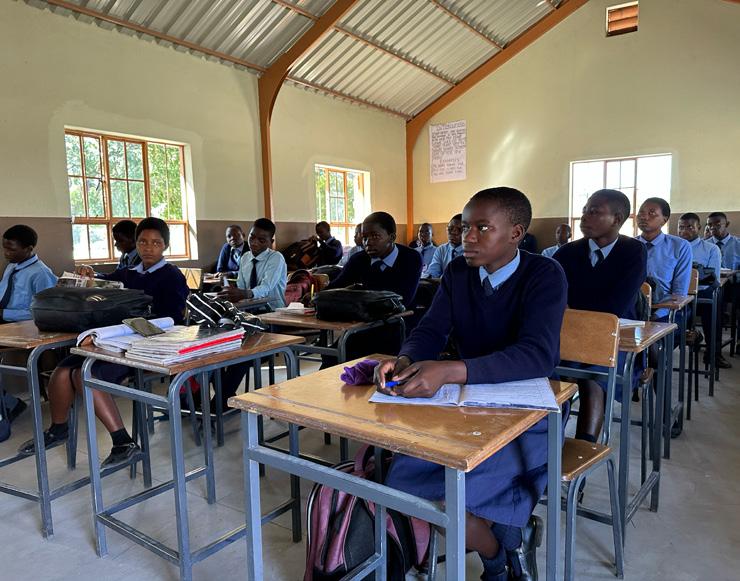
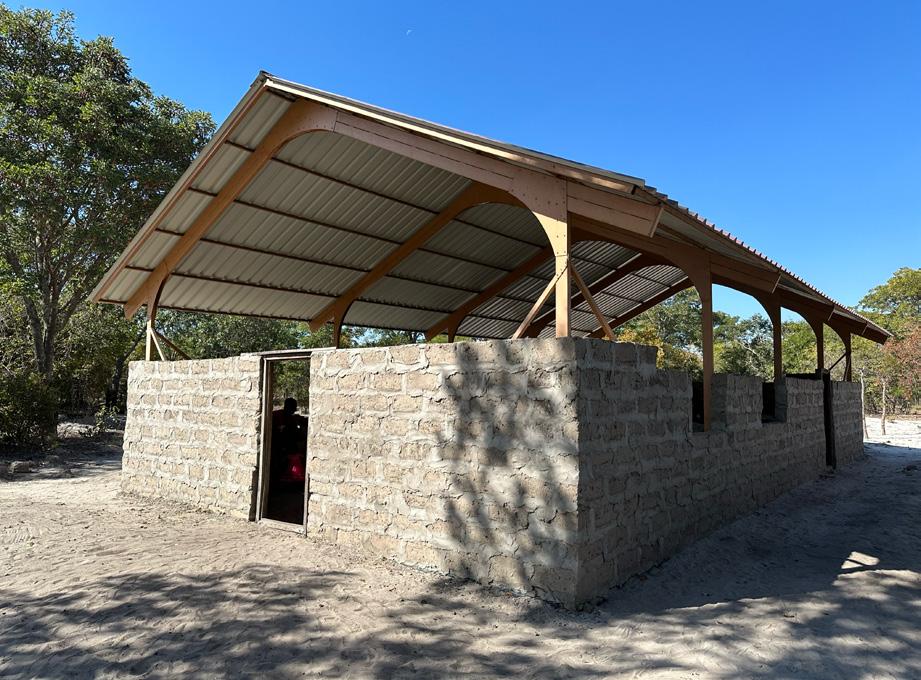
16 | THE VOLUNTEER ISSUE 3, 2023 www.maranatha.org
WATER WELLS
Crews have been busy drilling water wells all over Zambia, as clean water continues to be elusive to many people. In 2023 alone, Maranatha has a goal to drill 300 water wells in the country.
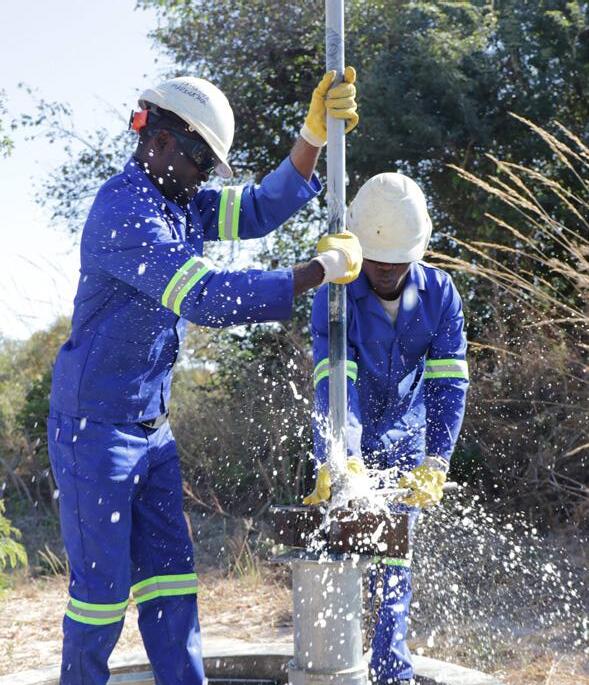
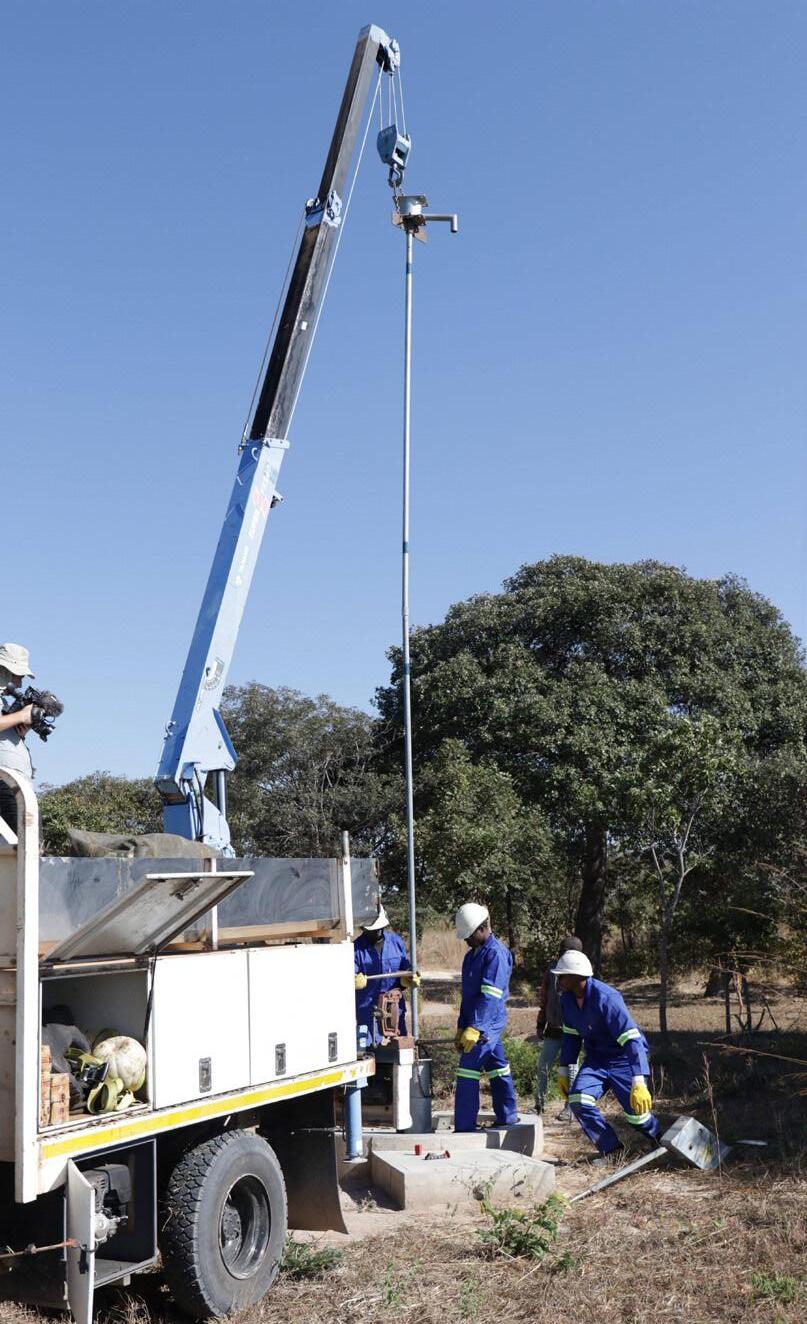
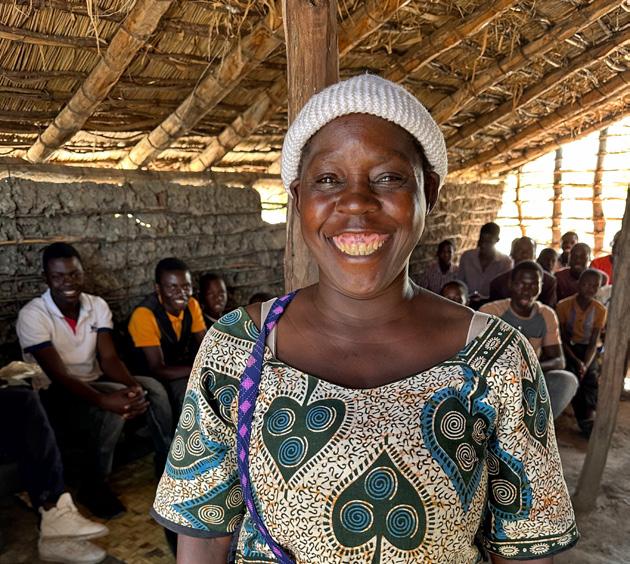
Uyba Kaenda gathers water from the well at the Chilele church. Previously, she was scooping water from a shallow hole in the ground, an effort that frequently left her sick. When she saw that the Adventist Church had drilled a well and was willing to share it with the community, she started attending the Chilele church and was baptized soon after.
WATER MAINTENANCE
Like any other structure, water wells require maintenance and repairs, especially when it is being used multiple times a day by hundreds of people. And once a well is broken, people are back to drinking contaminated water or spending inordinate amounts of time searching for clean water. In response to these challenges, Maranatha created a team to check on wells to ensure that they are working properly. They travel all over the country responding to calls for assistance.
Crews visit multiple well sites a day, preemptively evaluating existing wells and replacing parts as needed. Each site also has a phone number for people to call when a well needs repair. Maranatha has a goal to repair 300-400 water wells in Zambia this year.
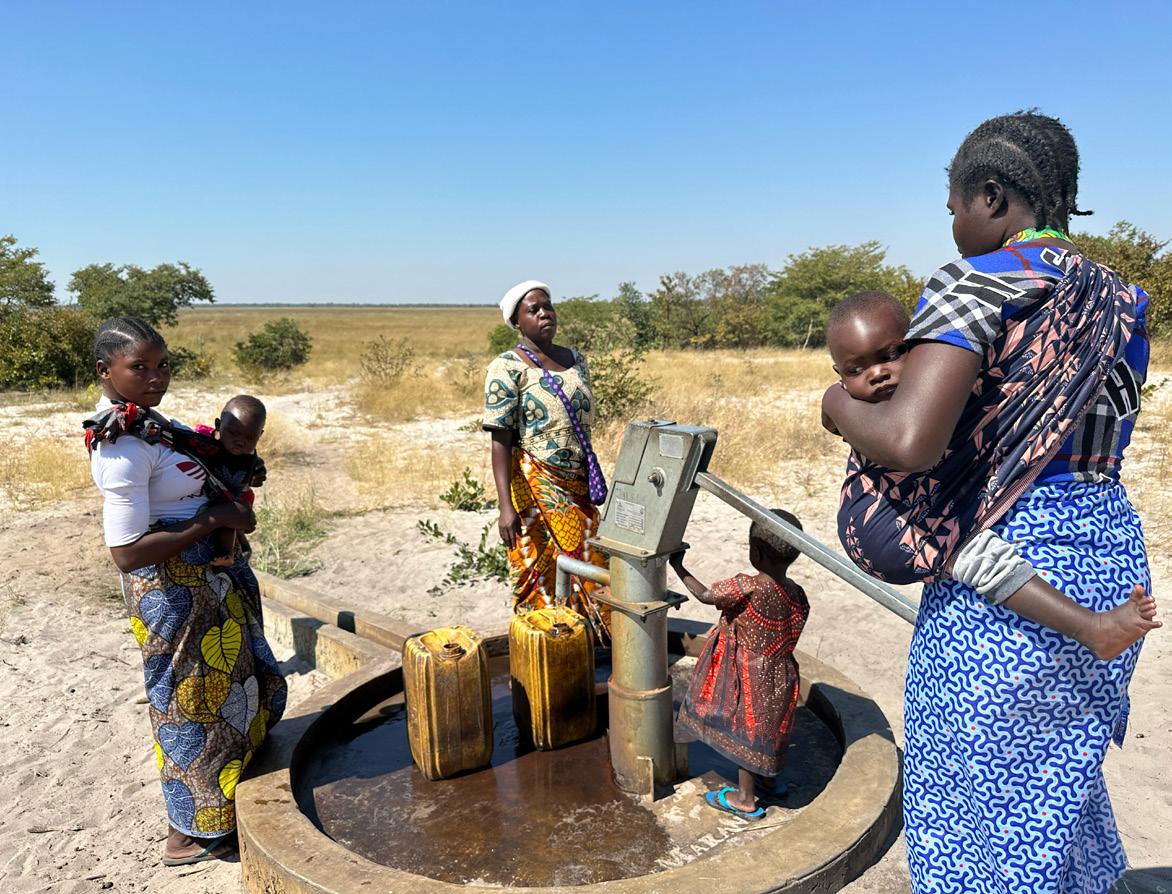
www.maranatha.org THE VOLUNTEER ISSUE 3, 2023 | 17
CATALYST: A BRAND NEW SPARK
Surrendering a week of their summer, 22 Gen Zs marked Maranatha history by participating in the first annual Catalyst mission trip. This newly rebranded program was designed to offer people ages 18-28 the opportunity to serve while experiencing an uplifting community of peers.
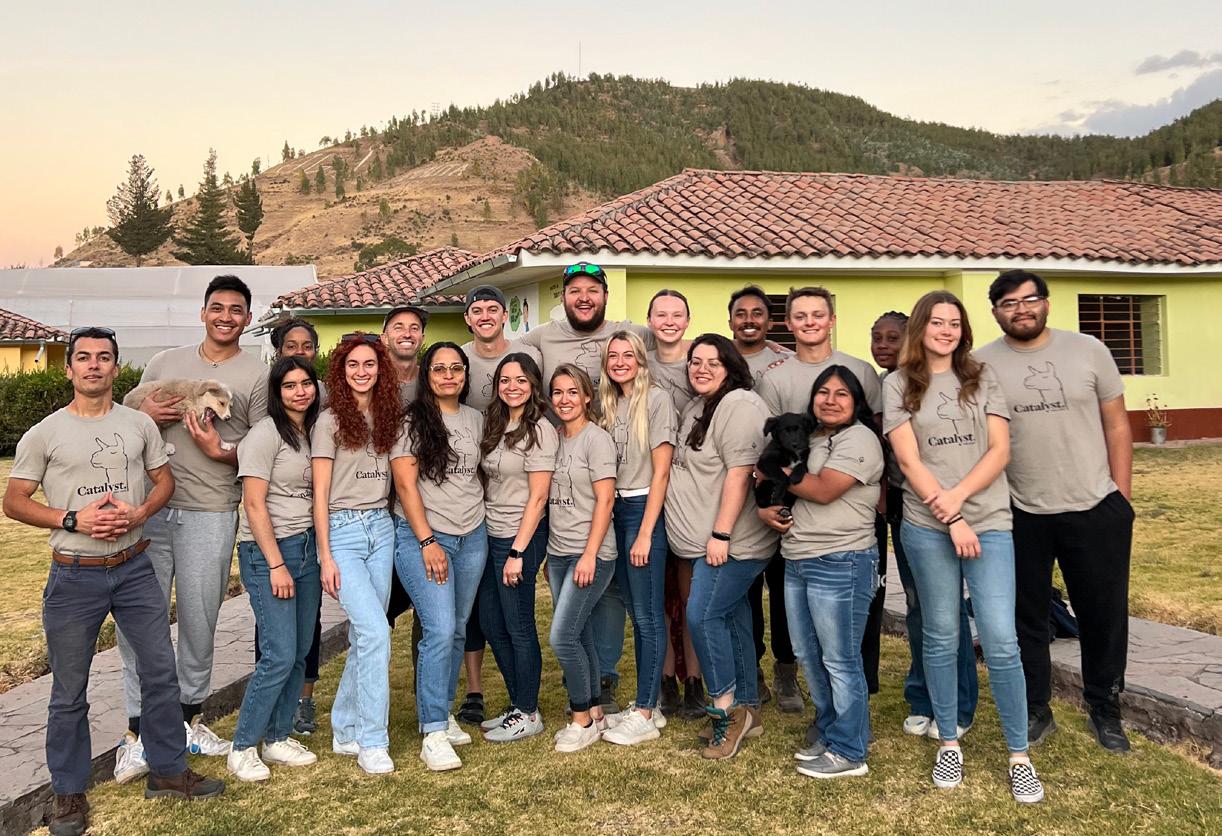
Last fall, Maranatha reached out to longtime volunteer Jessica Osborne and her husband Joseph with a proposition—would they be willing to lead a trip for young adults? The Osbornes were hooked. “It’s the age where you’re making a ton of different decisions. You don’t know what you’re doing with your life,” explained Jessica. “It’s an age where you’re deciding if you want God to be a part of your life or not, right? It’s an age where you’re making a ton of decisions, and it can be hard. I mean, we’re 30 and we remember what that was like.”
The Osbornes worked closely with Maranatha, revamping the trip’s branding to emphasize the transformative role service can play in changing the trajectory of one’s life. “We wanted this trip to be a catalyst for their life. To be the spark. The change that led them in whatever direction they are choosing to lead,” said Jessica. Fittingly, the program’s motto became “spark change through service.”
The primary service goal of their trip was to build a church for the Izcuchaca Seventh-day Adventist congregation. One look at the current structure, and volunteers understood how badly a new one was needed. One volunteer, Robinson Massey, described what he saw. “The current Izcuchaca worship space is kind of beat up, run down, and small. It’s not really able to house all their needs … There’s really small rooms starting to fall apart.” Massey understood how important a church building could be for any congregation. “There’s a sense of security and stability and safety that comes with having your own worship space.”
The Izcuchaca congregation understood this as well, constantly expressing friendly welcome and endless gratitude. Volunteer Caleb Batista was touched by their outlook. “They’re extremely happy. They are grateful for the little bit of work we’ve provided just in a week,
www.maranatha.org
Collegiates are inspired and empowered while serving on a freshly rebranded trip, just for them.
By Sidney Needles
1
“We wanted this trip to be a catalyst for their life. To be the spark. The change that led them in whatever direction they are choosing to lead.”
which is not much, but for them it’s a lot… And they’re just happy to be part of the Seventh-day Adventist family.”
Volunteers also helped run a pop-up clinic for the local community. Over the course of just two days, 333 patients were provided with general checkups, dental cleanings, vision screening and glasses, or counseling. For many patients, this was their first visit to a medical professional–ever. Jessica, a registered nurse, recalled treating one such patient who suffered from undiagnosed epilepsy. “We were able to teach her about seizures and how to deal with them, which was crazy in itself to think that she…had this for a long time and just didn’t know what to do about it.”
Several volunteers pursuing degrees within healthcare fields were thrilled to gain handson experience. “It was just so exciting for me because I am a nursing student and that was the first time I got to practice on real patients. I do it all the time with my classmates at school, but to play such a vital role with patients, it was very heartwarming for me,” said Kayla Scott.
In addition to providing a blessing for the Izcuchaca community, Catalyst aimed to send volunteers home with their own blessing–an uplifting network of like-minded peers. Trip leaders were initially wary of potential barriers to connection. The group was a beautifully diverse swath of members from Canada, Europe, the Caribbean Islands, and the U.S. But would the diverse age-range pose a threat to common ground? After all, an 18-year-old was in a much different phase of life than a 28-year-old. Could strong community be fostered within a week?
Team leaders were overjoyed to discover the answer was a resounding “yes!” While a church of brick took shape during the day, nightly worships saw a different kind of construction. “The first couple worships, nobody opened up or shared, and then by day three or four, people are talking and they’re wanting to share what they learned that day or the things that they saw and the things that changed their day. So that part for us is all right. That feels good. People are learning something. They’re seeing there’s change happening,” said Joseph.
Worships were also a place of spiritual discovery. Massey had been recruited as a music leader and was impacted by this aspect of his role.“God works through everything we do. In the mundane. In the small. In the grand. Whether it’s flying across the ocean to Peru or just sitting in a room singing songs together.”
Catalyst’s first trip indeed sparked an ember of change. An ember to fuel hearts with passion and engulf lives in fiery purpose. Scott described her desire to share this warmth. “It shows me how much of a catalyst I need to be. Being on this mission trip shows me that everywhere you go, you can truly make a change, and that’s exactly what we are doing here in Peru. So from now on, I kind of see the world as something that is waiting on me to spark a change.” With this exciting precedent set, Catalyst shows promise of communities served and collegiates empowered for years to come.
YOUNG ADULTS WITH A MISSION:
1 The first Catalyst team, made up of 22 young adults, pose for a group photo.
2 Volunteers construct the top level of the Izcuchaca church in Peru. The congregation here started in 1999 and has already helped to form four sister churches.
3 Volunteers help at the pop-up clinic they helped to organize. In total, the clinic saw 333 patients.
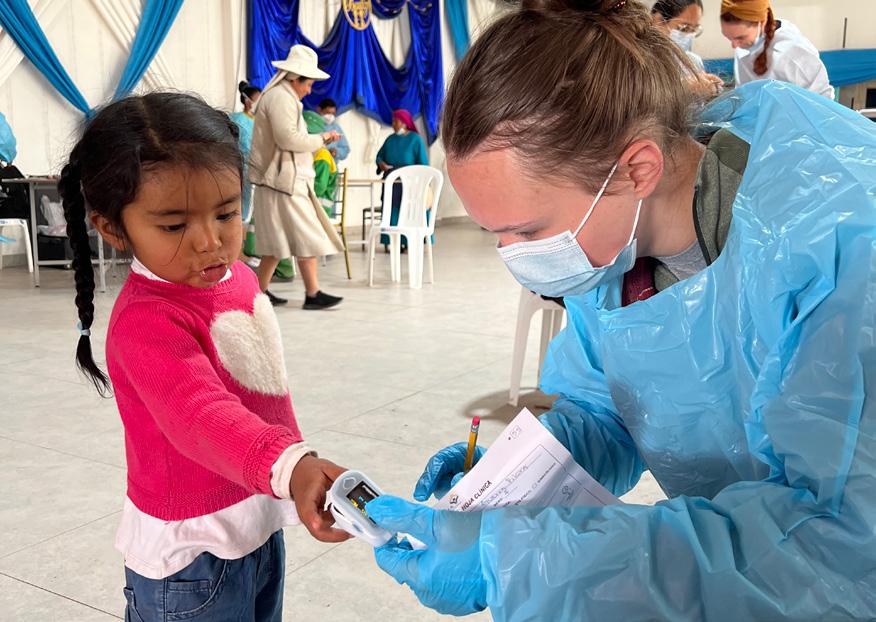
4 Volunteers lay block at the church site, located near the city of Cuzco. When complete, the new sanctuary will serve a 40-member congregation.
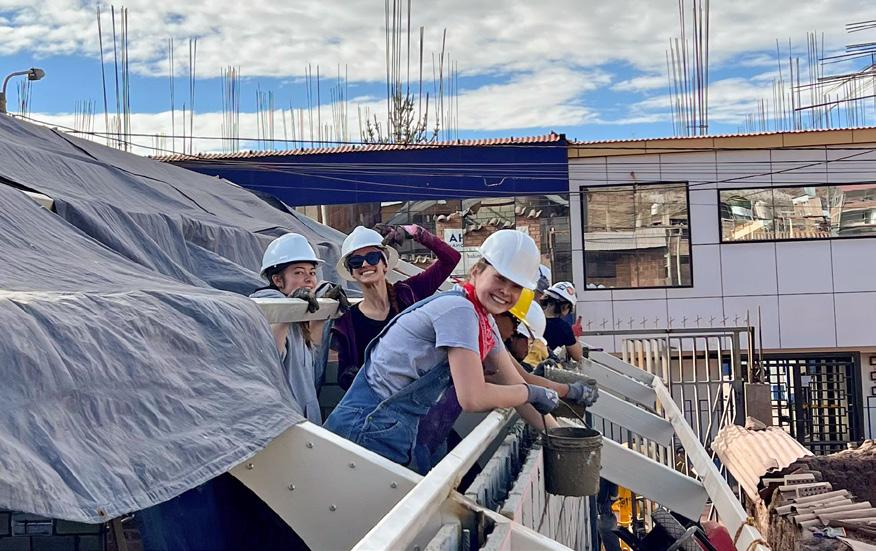
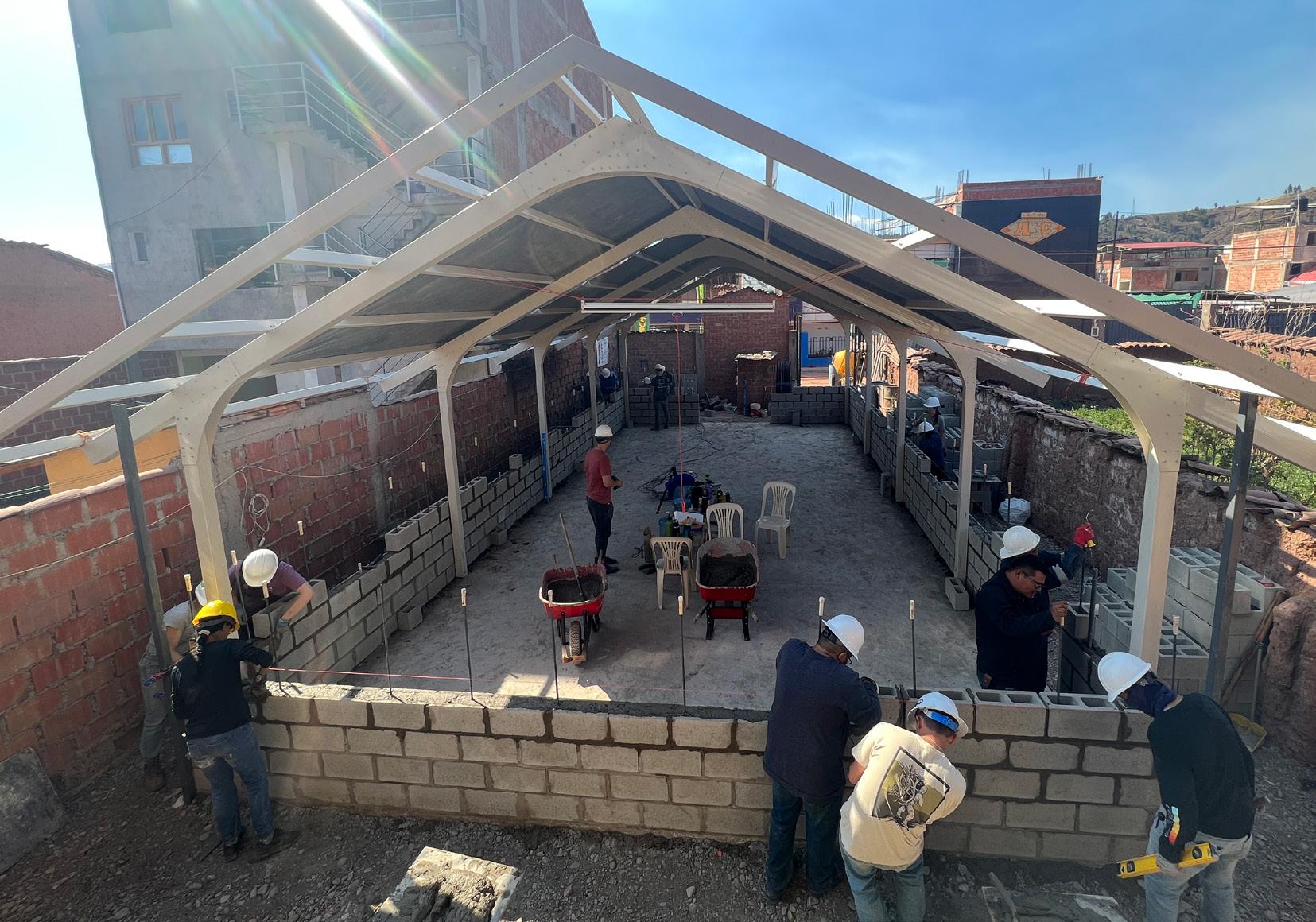
www.maranatha.org THE VOLUNTEER ISSUE 3, 2023 | 19
PHOTOS BY (1) JESSICA OSBORNE
2 3 4
(2) JOSEPH OSBORNE (3-4) CLAY KRUSE
HOW YOU’VE
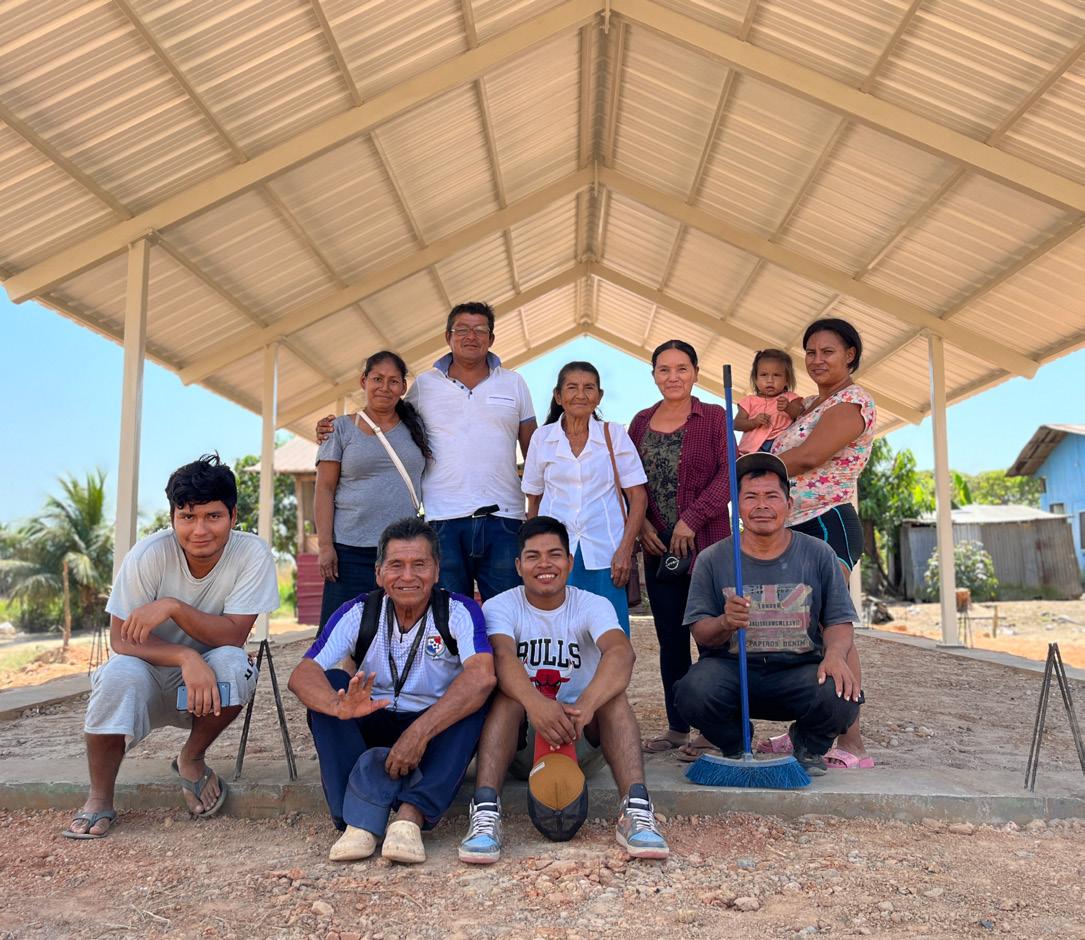
Helped
VALLE DE LOS LIRIOS , PERU
LEAVING YOUR Legacy
After hearing a presentation about a school in Kenya in desperate need of help, Carrie LeBarre’s students at Pine Hills Academy in California sprung into action. The first and second graders were moved from learning about the deplorable conditions at the Kimogoro Adventist School and decided to donate money received from their annual Book Blitz. The campaign encourages children to read while at the same time raising funds for charity through sponsors that will donate per page read. In all, the class of 16 read 16,316 pages, resulting in a donation of $1,154!

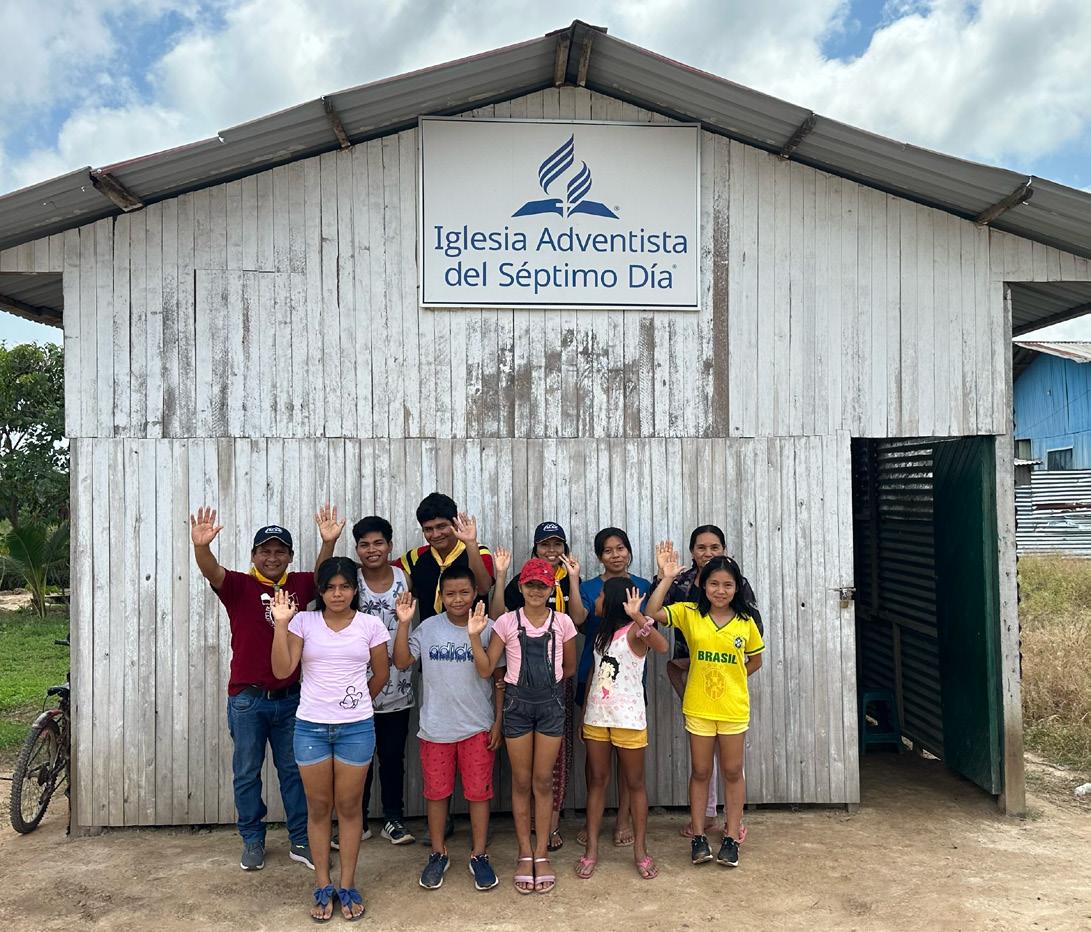
A look at how your support is making a real difference for communities around the world.
BEFORE Church members met in a rickety shed that was water-damaged and unstable.
AFTER Maranatha constructed a strong steel frame and roof that ensures safety and peace of mind.
PROJECTS THAT NEED YOUR HELP
These are the projects in most urgent need of funding right now. Please consider making a donation!
PERU CHURCHES
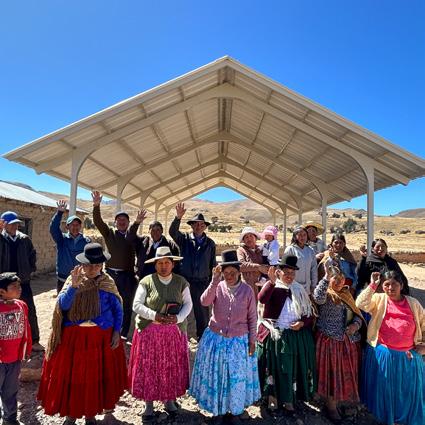
Maranatha is entering the rainforest to build churches while finishing up projects around Juliaca and Puno. Currently, we are building a frame, roof, and foundation in Peru, and then the local congregation will complete the walls, windows and doors. Many of these church projects still need funding. Please help us to assist as many congregations as possible by making a donation to this program. You can sponsor a full church at $15,000, or you can donate any amount for projects toward Peru.
DORMITORY: LIUMBA HILL ADVENTIST SCHOOL
Families are scrambling to send their children to Liumba Hill, even if it means living far from home. But students who come from afar have to find their own housing in town because the school does not have a dormitory. This is not ideal as they have to balance studying with the responsibilities of caring for themselves. It can also be dangerous to live with strangers and leaves them vulnerable to thievery and assault. Maranatha is building a new girls’ dormitory. The total cost is $200,000; thanks to a generous donor we are more than halfway there. Make a donation of any size to help us reach the goal!
ONE-DAY CHURCHES: ZAMBIA

Maranatha has a goal to build 120 One-Day Churches in the country. A special Maranatha crew travels from site to site and assembles the structure. Then, church members work together to build the walls using local materials. This important program has provided much-needed places of worship in some of the most rural regions, where traditional construction is near impossible. Each kit, which has a steel frame and roof, starts at $7,500. Make a donation of any size toward this program or fund an entire One-Day Church.
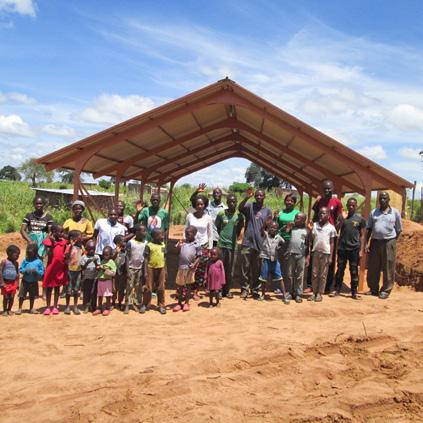
www.maranatha.org
Countries
IN 2023
BRAZIL
CUBA DOMINICAN REPUBLIC INDIA KENYA PERU
STATES
CHURCHES
WELLS CAMPS
Here’s where Maranatha is working this year.
CANADA
UNITED
ZAMBIA ZIMBABWE
SCHOOLS WATER
PROJECT Calendar
22 | THE VOLUNTEER ISSUE 3, 2023 www.maranatha.org DOMINICAN REPUBLIC FOUNDations 2023 Team | Texas ZAMBIA The Place Adventist Fellowship Team | California
Group Project Teams served
the
of July through September. Thank You FOR SERVING Go to maranatha.org to see all the volunteer opportunities being offered, including full projects and mission trips being coordinated by church or school groups.
The following
during
months
a Maranatha
trip!
out our upcoming opportunities
or
to maranatha.org for the
updated list. DATE PROJECT NAME PLACE LEADERS SCOPE Oct. 4-18, 2023 Summerville Adventist Church Project GEORGIA, USA Betty Beattie-Chrispell, Roger Hatch New construction Oct. 16-30, 2023 Alvarado Adventist Church Project TEXAS, USA Ron and Nancy Davis, Tom Pooler New construction Oct. 19-31, 2023 Zambia Project CHIPATA, ZAMBIA Susan & David Woods Clinic construction Nov. 7-21, 2023 Uchee Pines Project ALABAMA , USA Ernie and Jeanice Riles New construction Dec. 22, 2023-Jan. 1, 2024 Family Project: Peru SACRED VALLEY, PERU Christina Lloyd Church construction Dec. 31, 2023-Jan. 10, 2024 Camp Kulaqua Project FLORIDA, USA Betty Beattie-Chrispell, Jim Mills Church construction Feb. 1-11, 2024 Dominican Republic Project DOMINICAN REPUBLIC Karen Godfrey School construction March 2024 India Project BINJIPALI, INDIA TBD School construction Mar. 11-21, 2024 Multiple Group Project KAJIADO, KENYA Loretta Spivey School painting Spring 2024 Walla Walla University Project WASHINGTON, USA TBD Dorm renovations Jun. 20-30, 2024 Summer Family Project PUCALLPA, PERU Steve Case Church construction June/July 2024 Zambia Project MWAMI, ZAMBIA Kenneth Weiss, Karen Godfrey School construction
Anyone can join
mission
Check
here
go
most
KHASAMPUR, INDIA
Residents of Khasampur-C, located in the state of Karnataka in southern India, pose with their new submersible pump water well. Thanks to generous donors to Maranatha’s water program, crews drilled the well for the village earlier this year and
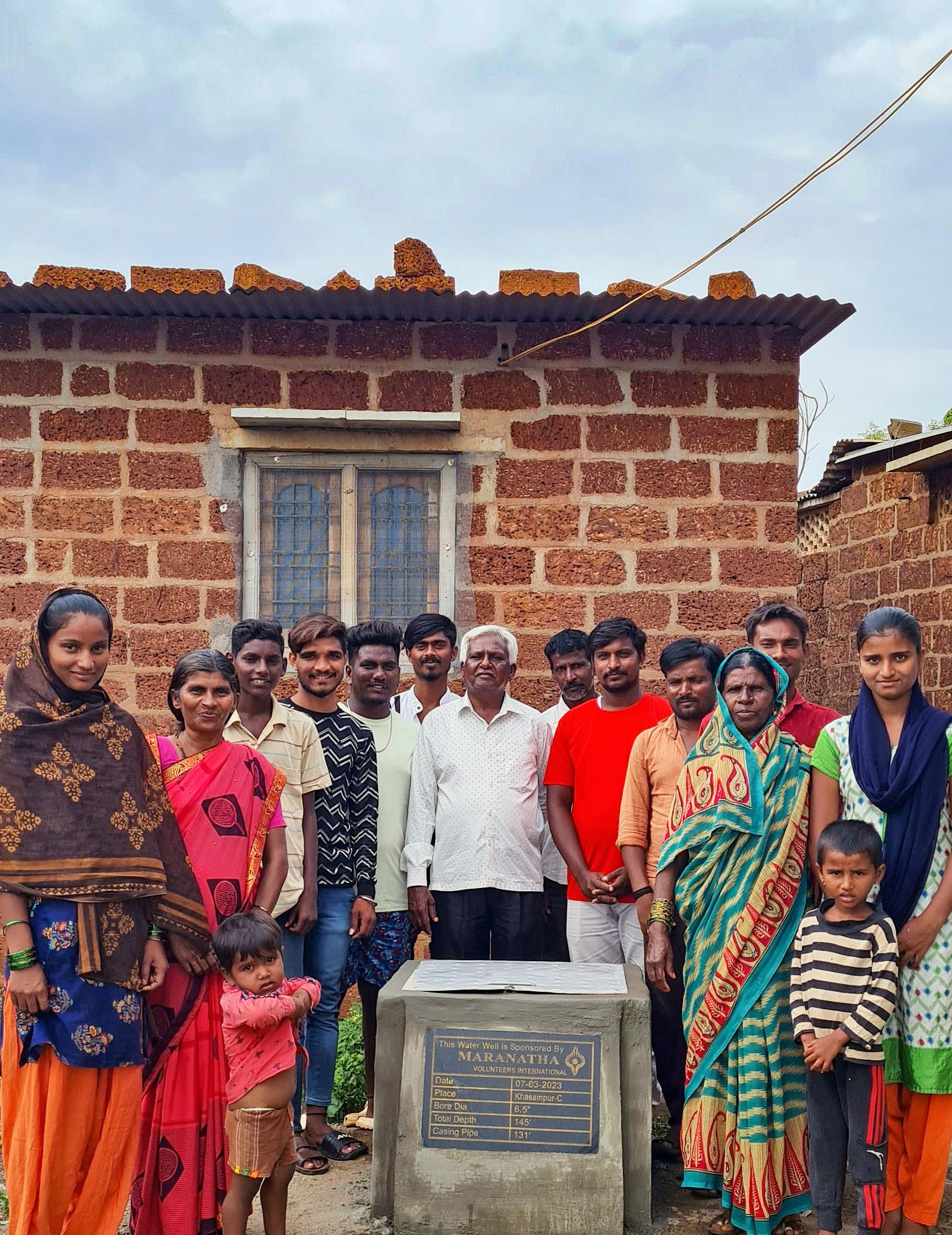
also provided a water tank. Previously, community members were relying on a government water supply that was only available once a day. This well is one out of a plan to provide 300 wells in India in 2023. As of September, Maranatha has
drilled more than 200 in communities without access to clean water. India has a population of more than 1.3 billion people, and an estimated 91 million people do not have access to clean water.*
*Statistics provided by water.org
Photo provided by Maranatha staff
990 Reserve Drive, Suite 100
Roseville, CA 95678
Building the “City of Heaven”
Maranatha is constructing a large pre-K through 12 campus in Ciudad del Cielo, a neighborhood in a region of Santo Domingo, Dominican Republic. This area has dozens of churches, but no Christian school.
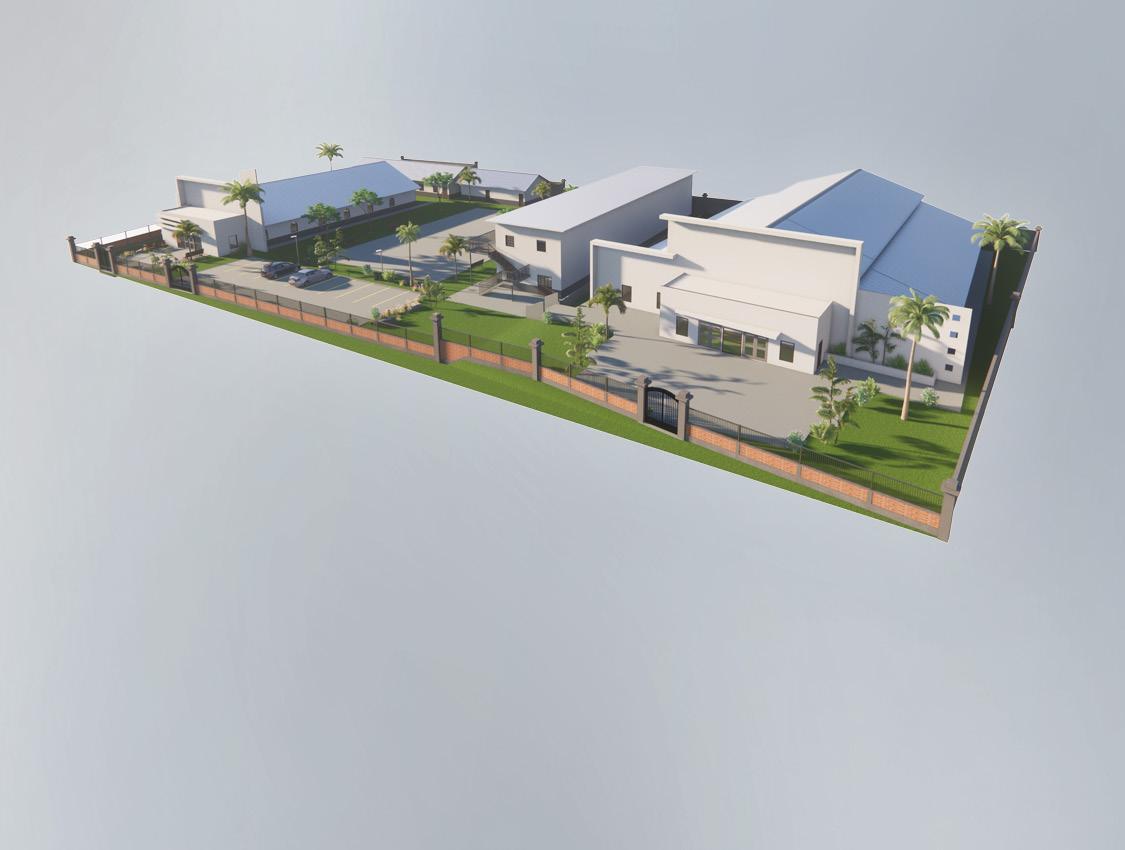
Make a donation to this high impact project, and your donation will be doubled, thanks to a $1.25 million matching gift.
Give today!
maranatha.org/cityofheaven
Travel into the mission field and see how God is leading ordinary people to make an extraordinary difference in communities around the world with our television program, Maranatha Mission Stories.
HOW TO WATCH
BROADCAST CHANNELS (ALL TIMES PT)
3ABN
Friday, 7:30 p.m.
Saturday, 2:00 p.m.
Hope Channel
Wednesday, 3:30 p.m.
Friday, 8:30 a.m.
Sunday, 8:30 p.m.
ON DEMAND
The Maranatha Channel App

Watch current and archived episodes and other videos on demand. Download for Apple, Android, Amazon Fire TV, and Roku.
watch.maranatha.org
View all episodes online at Maranatha’s video website. Find segments by using our “Search” function.
Non-Profit U.S. Postage PAID Rancho Cordova, CA Permit No. 361

















































